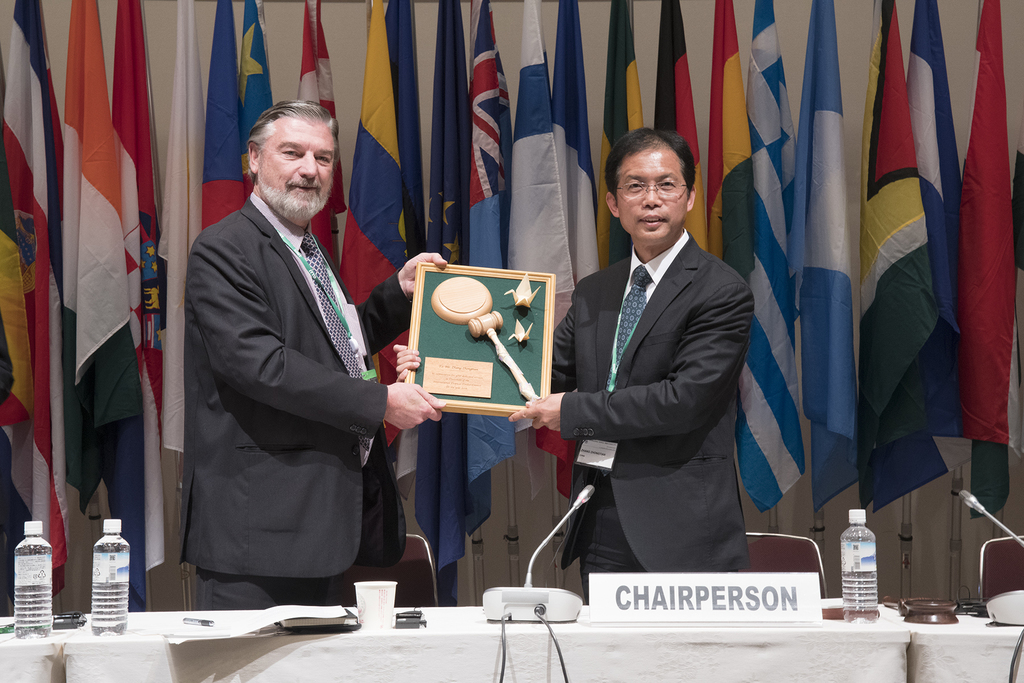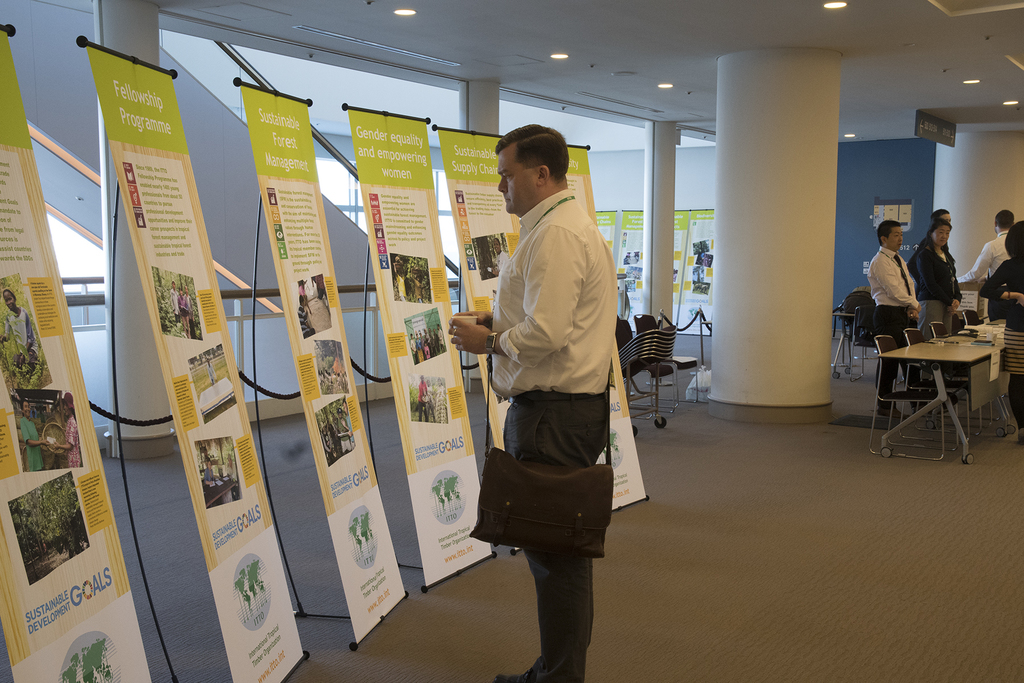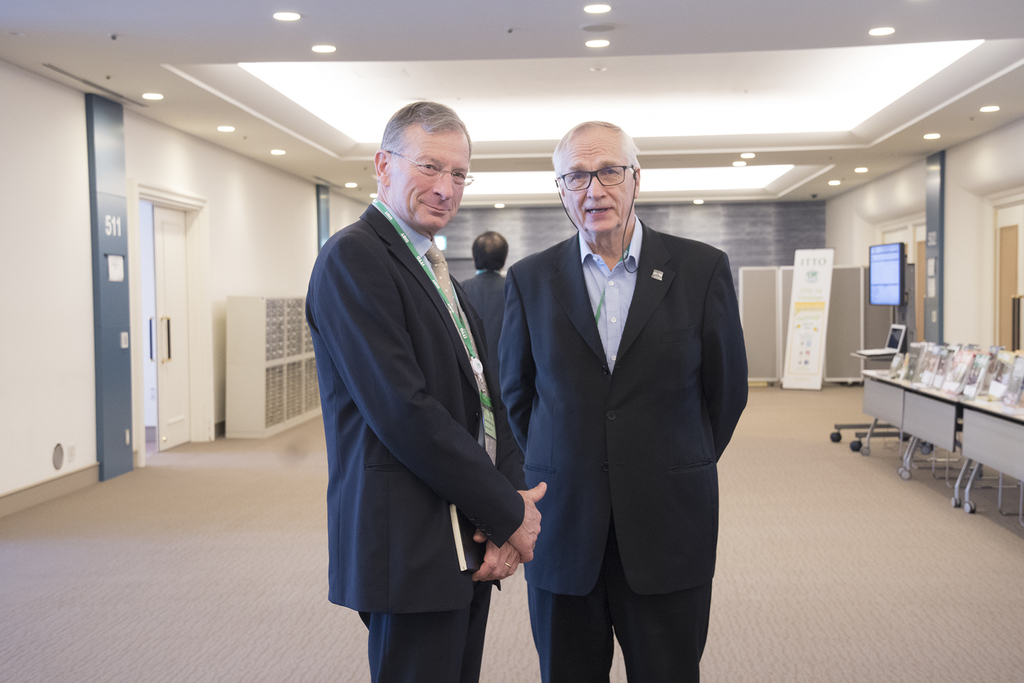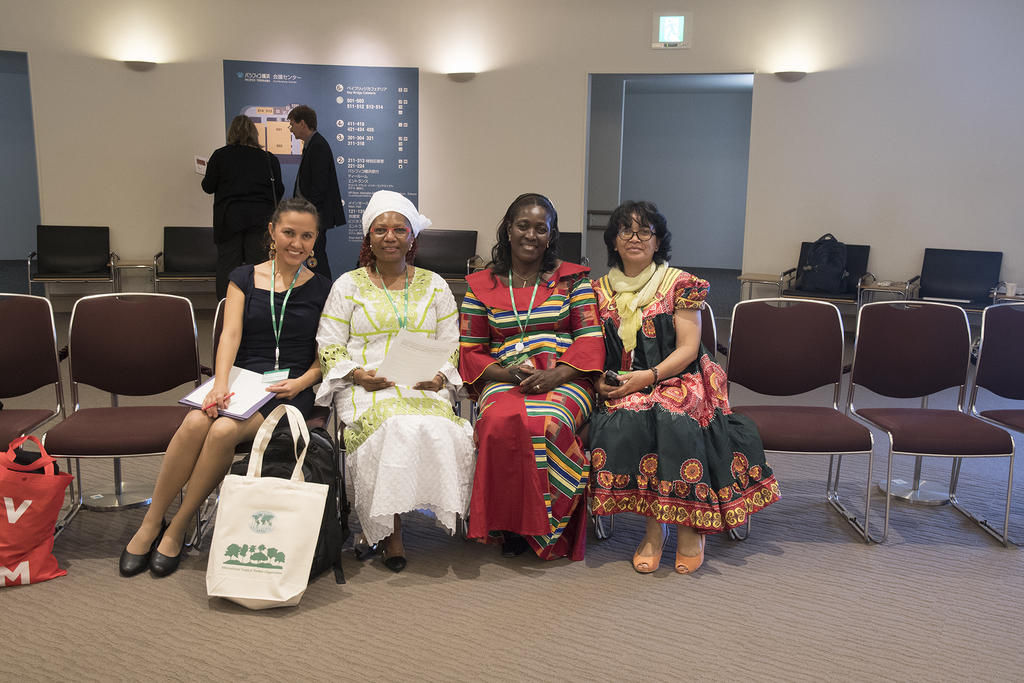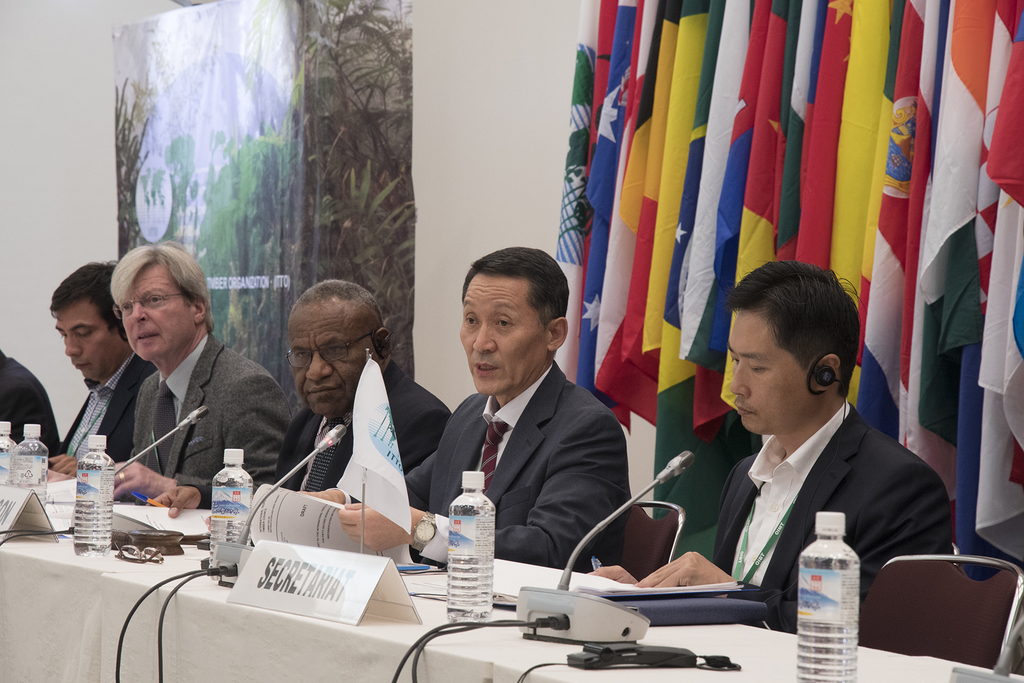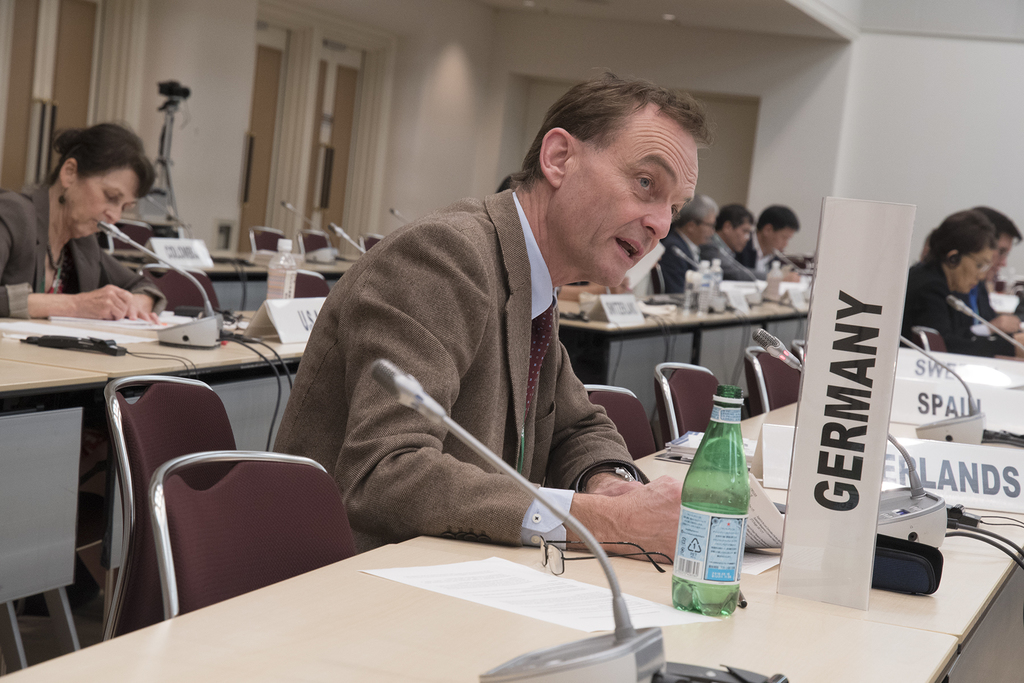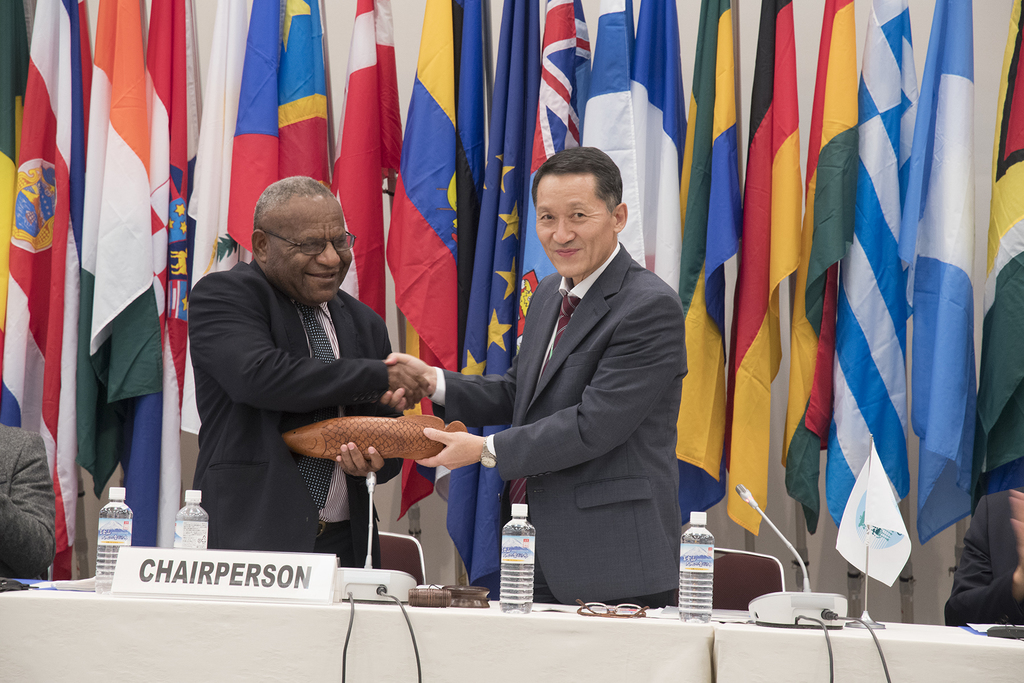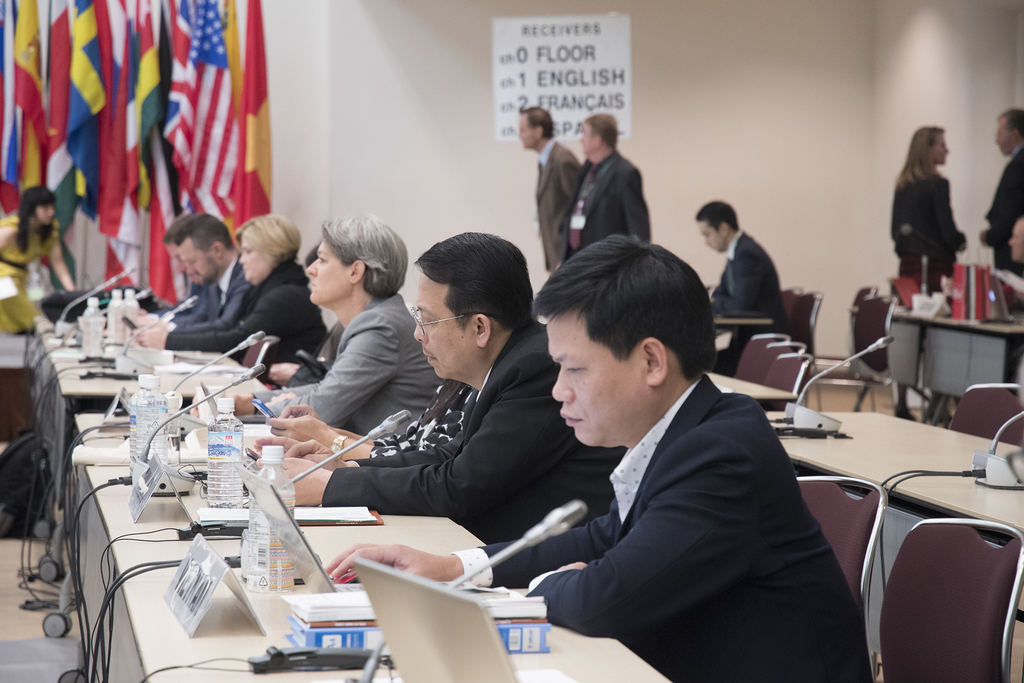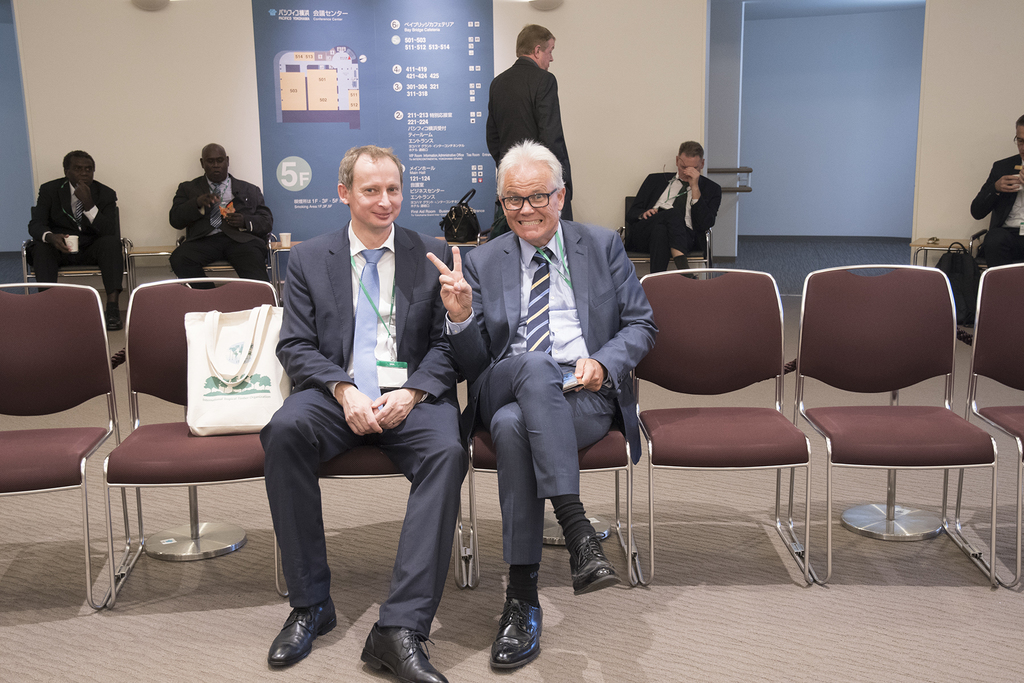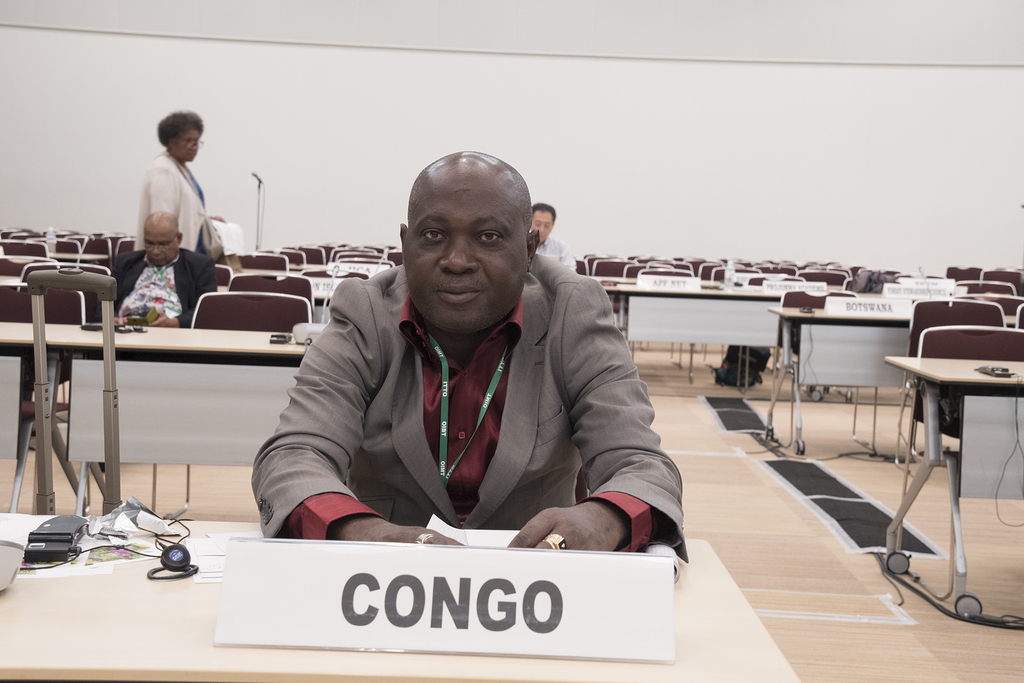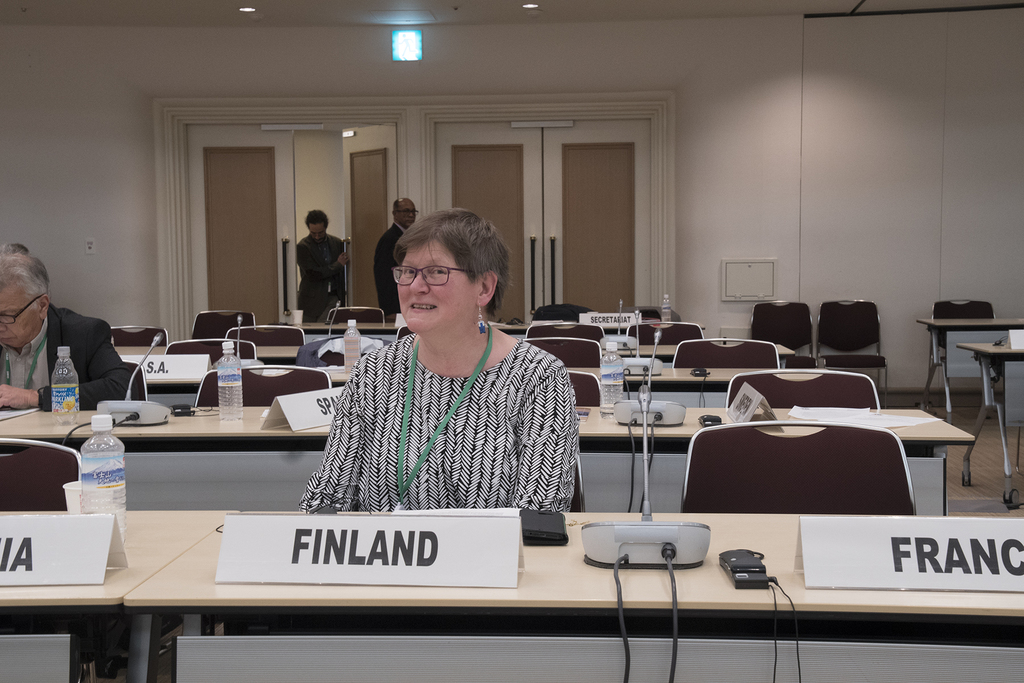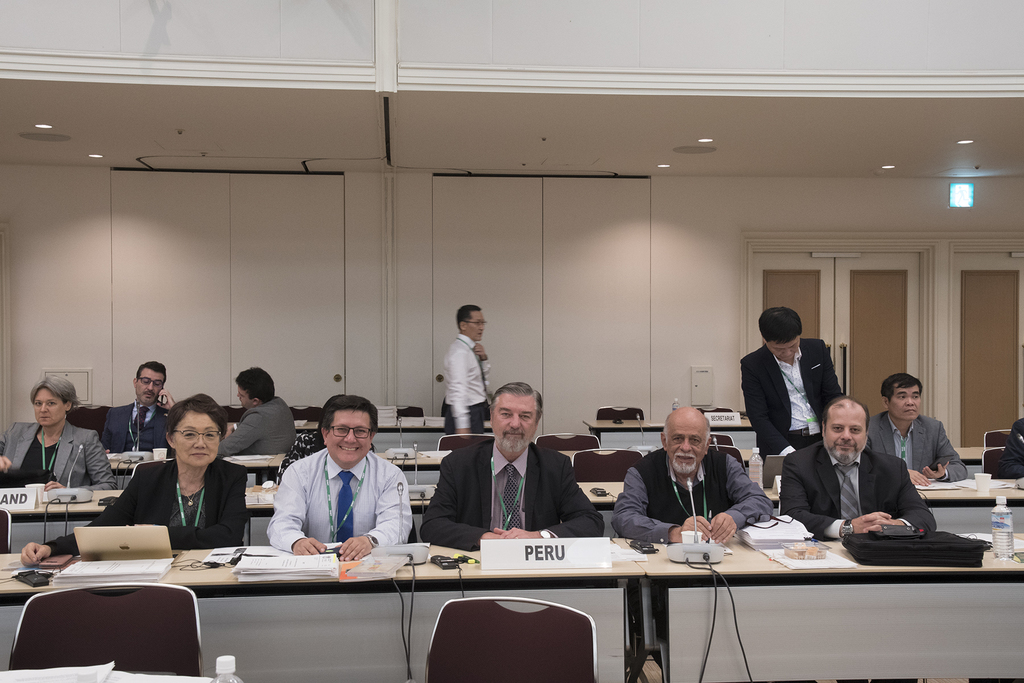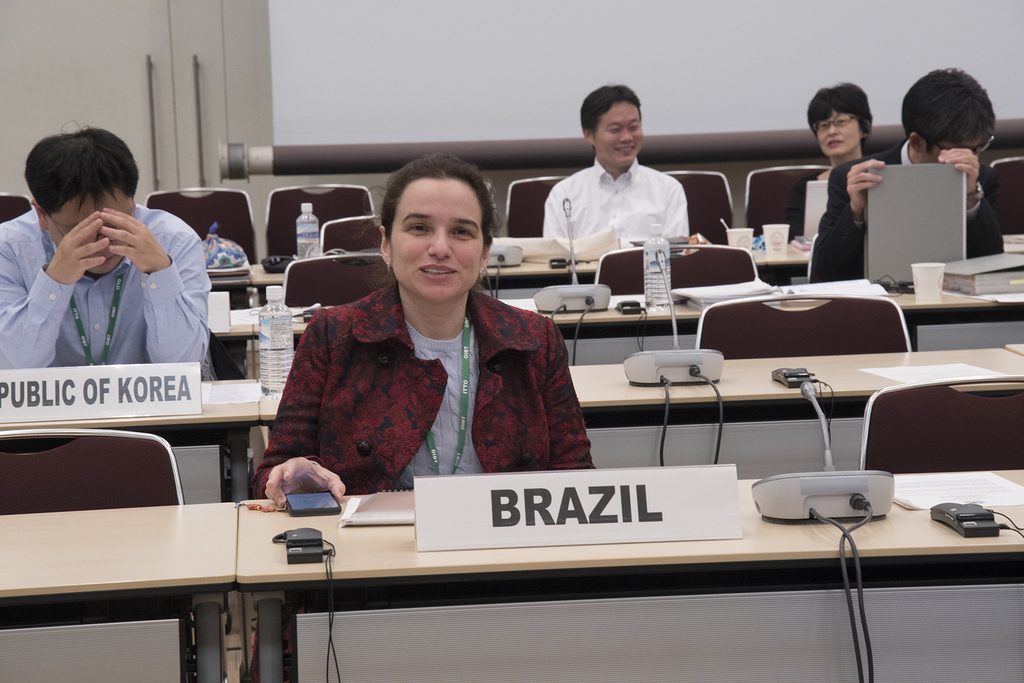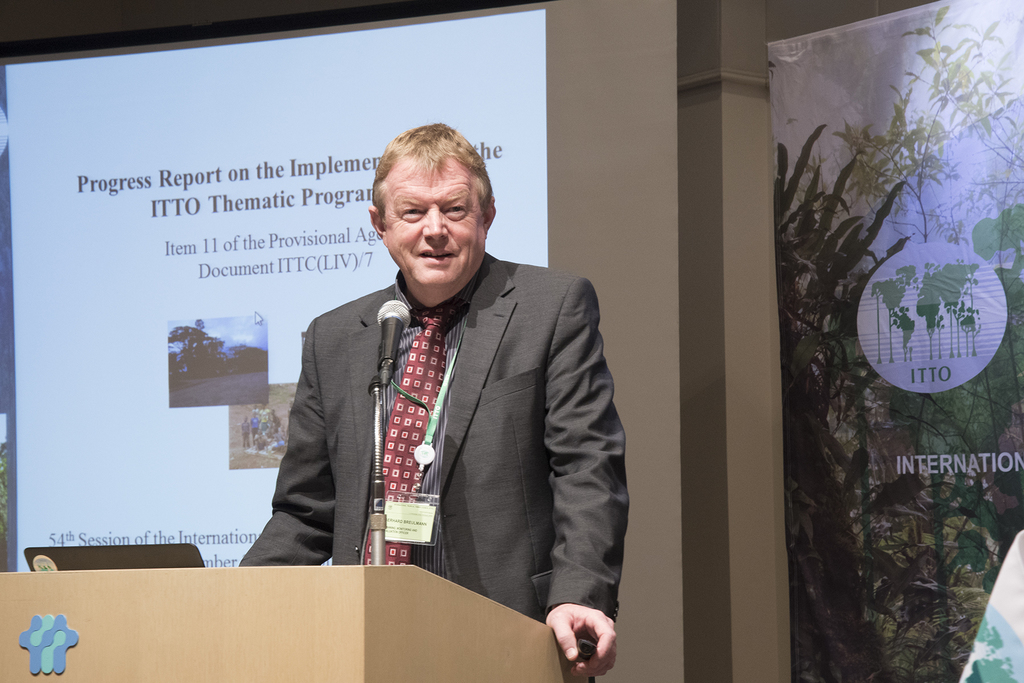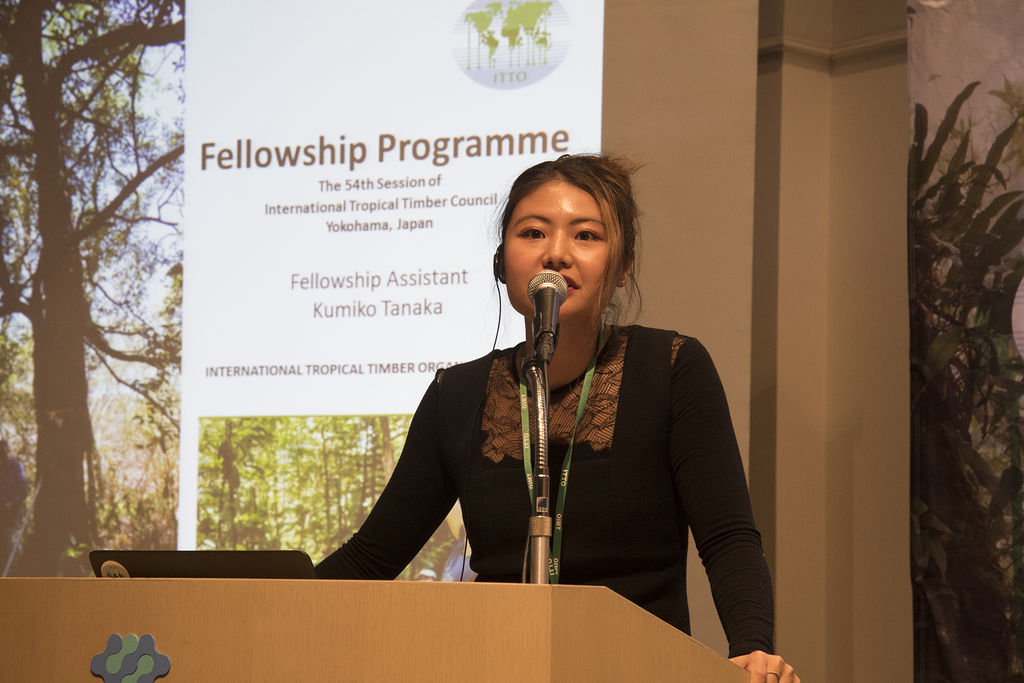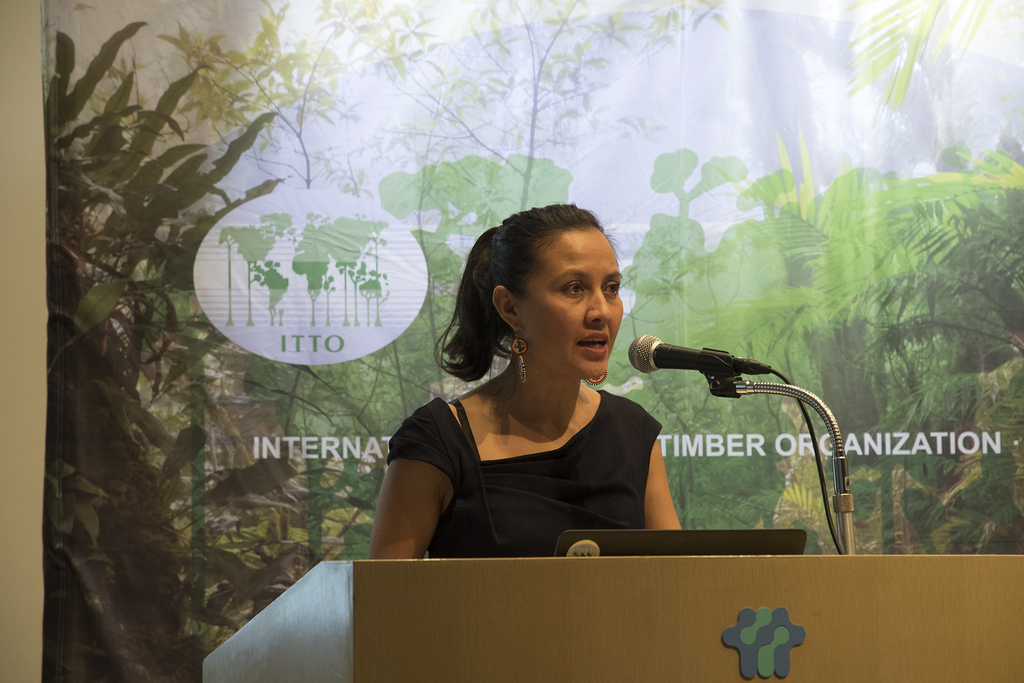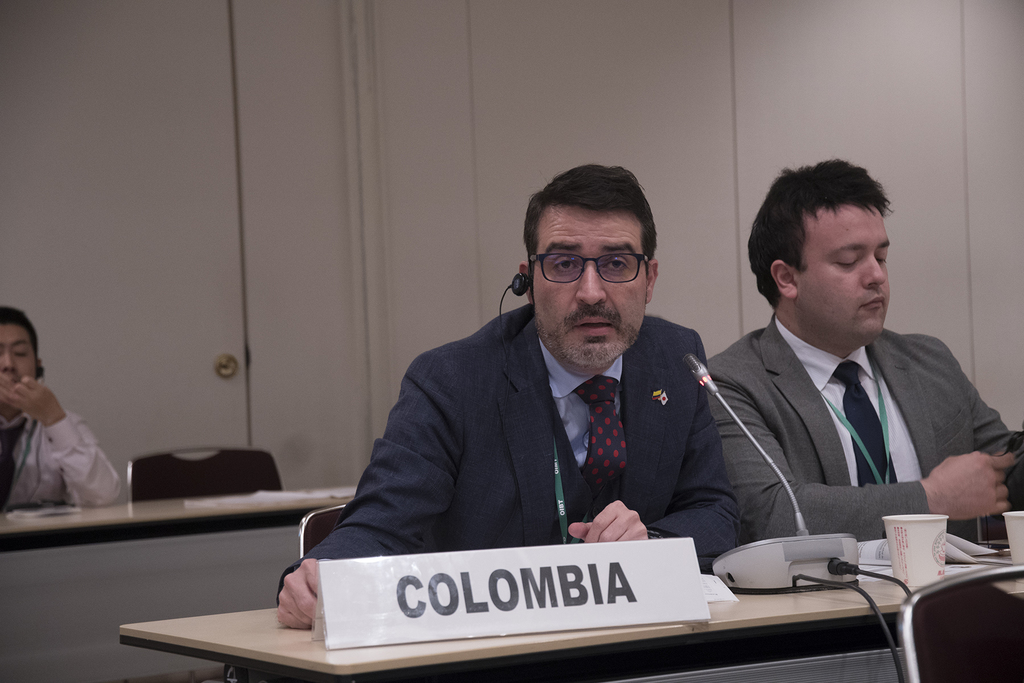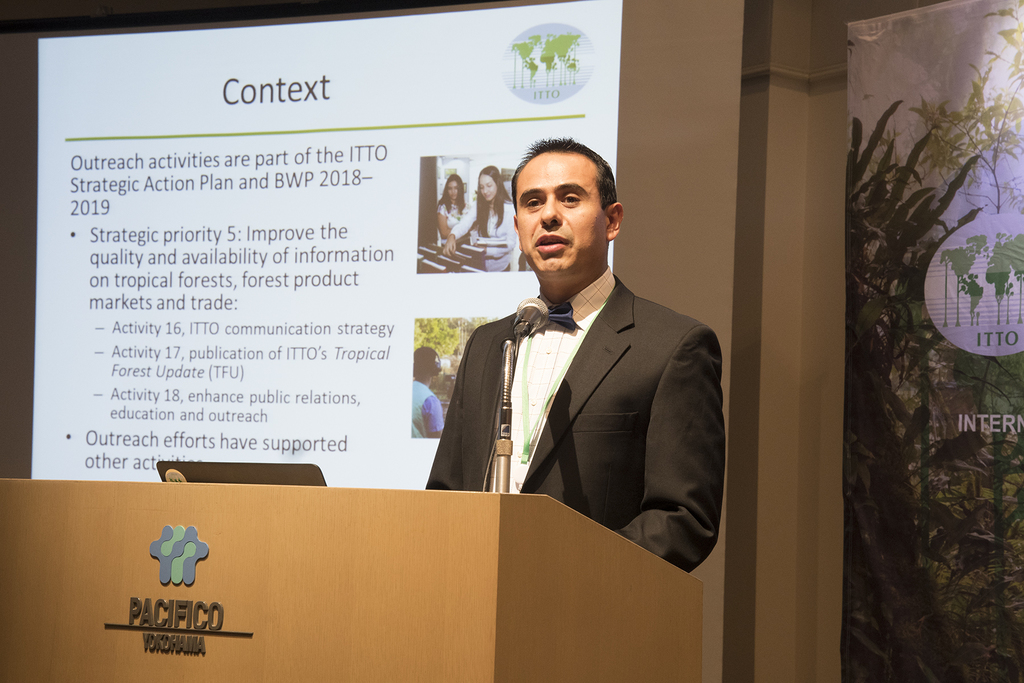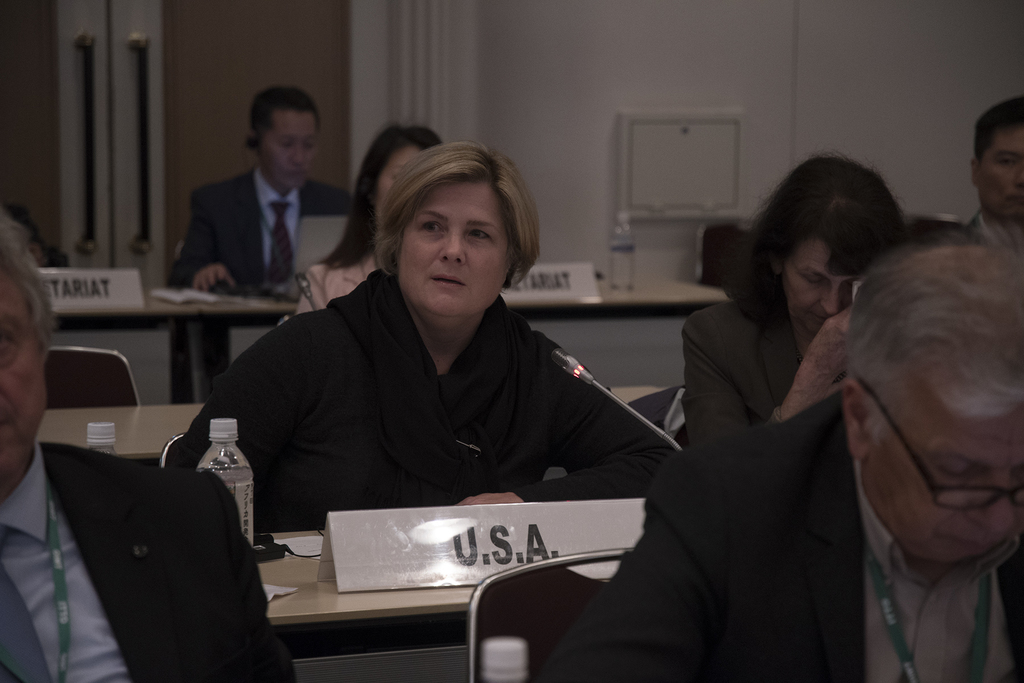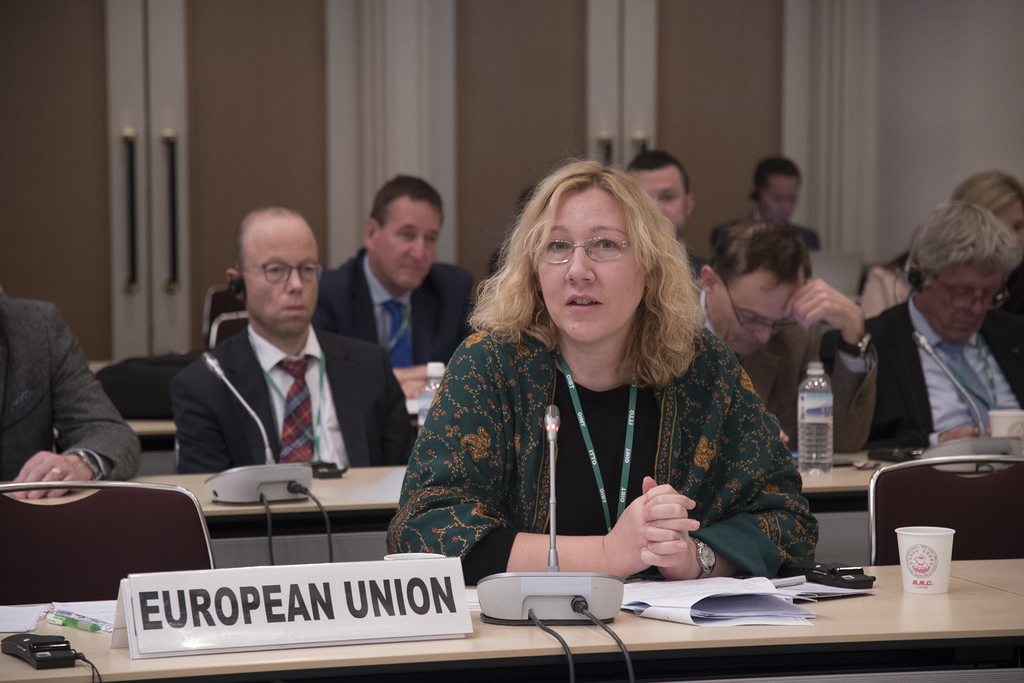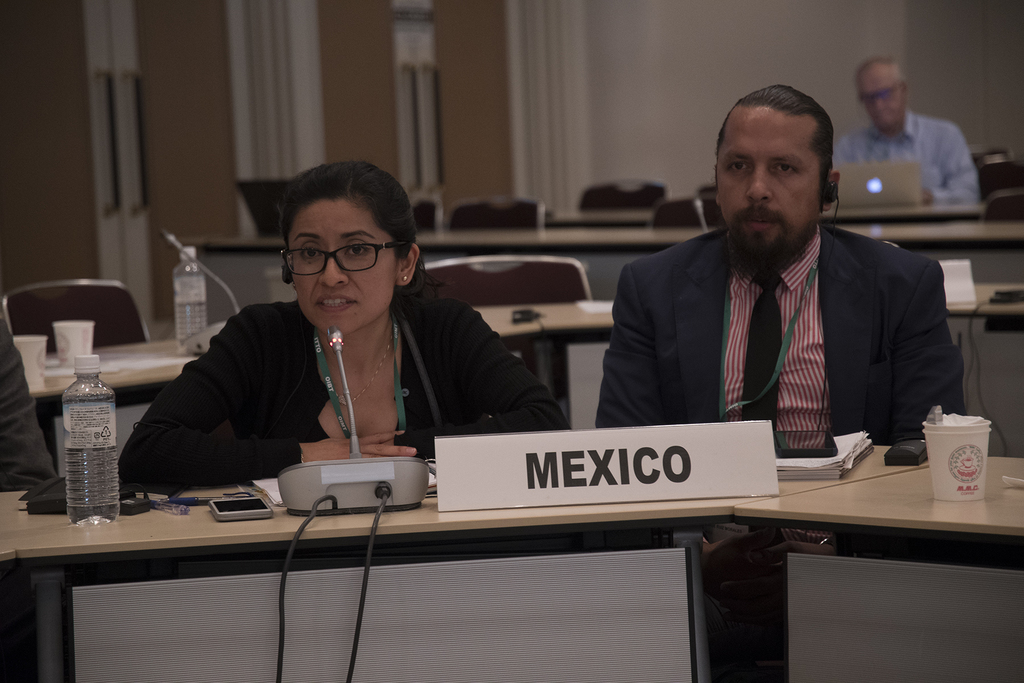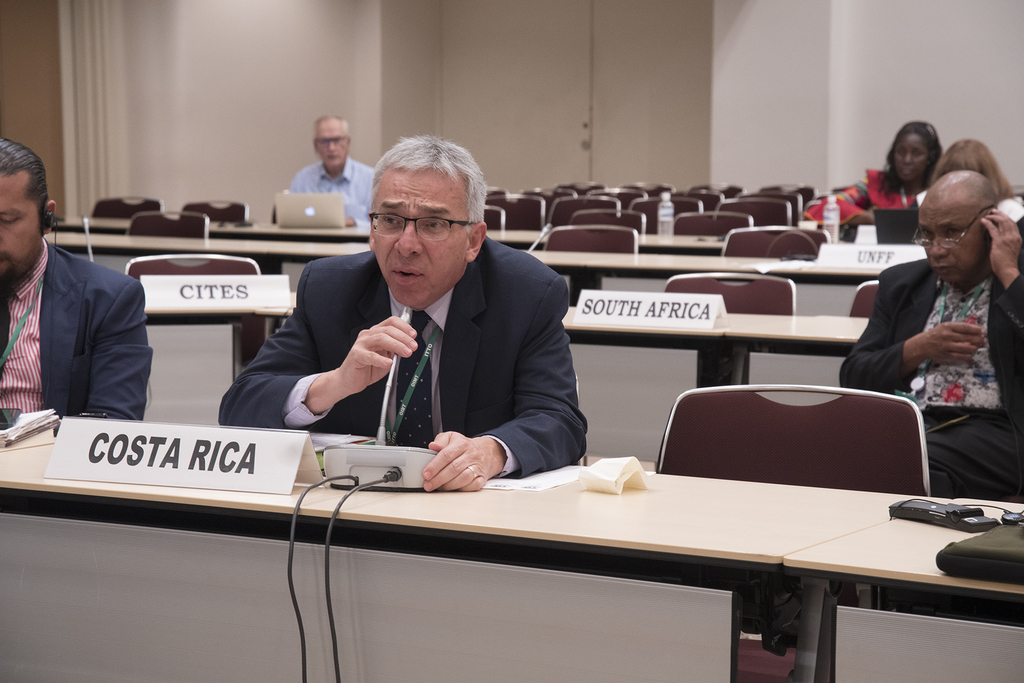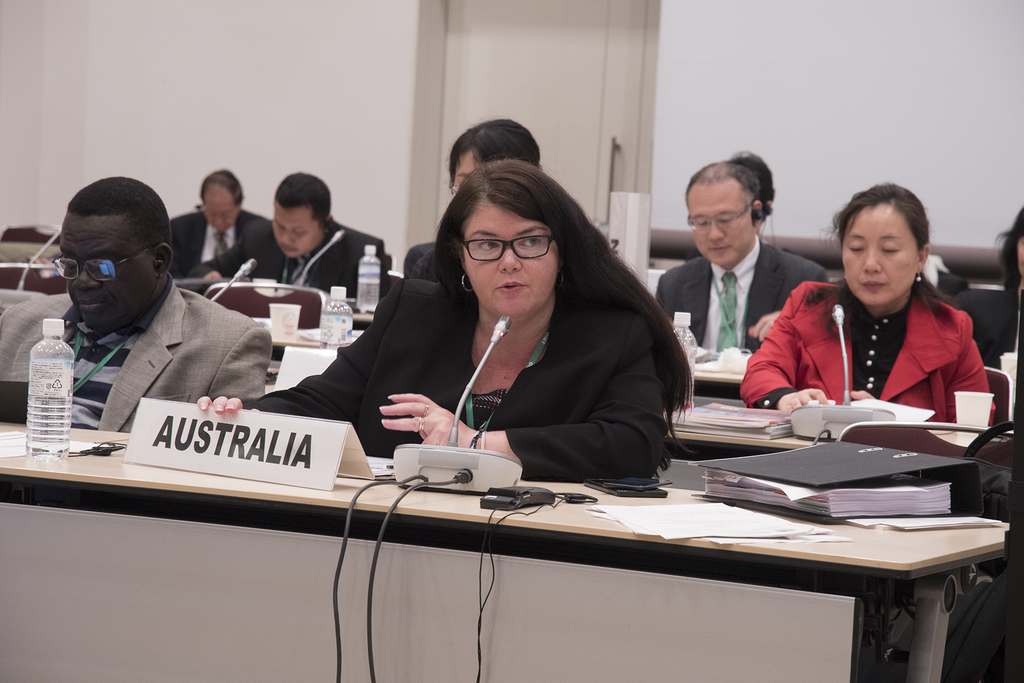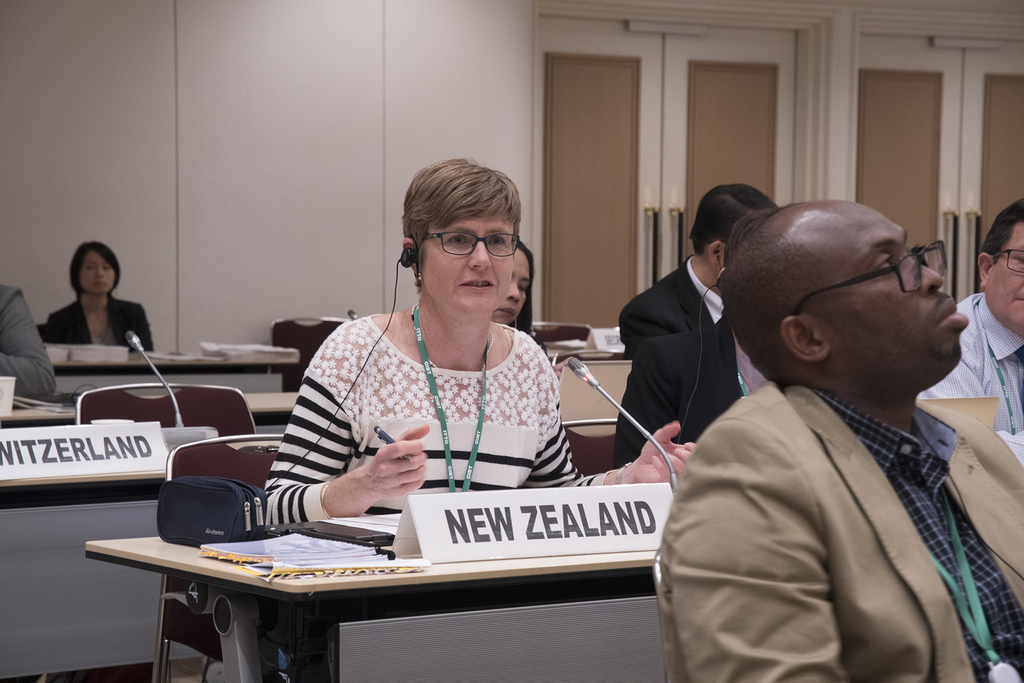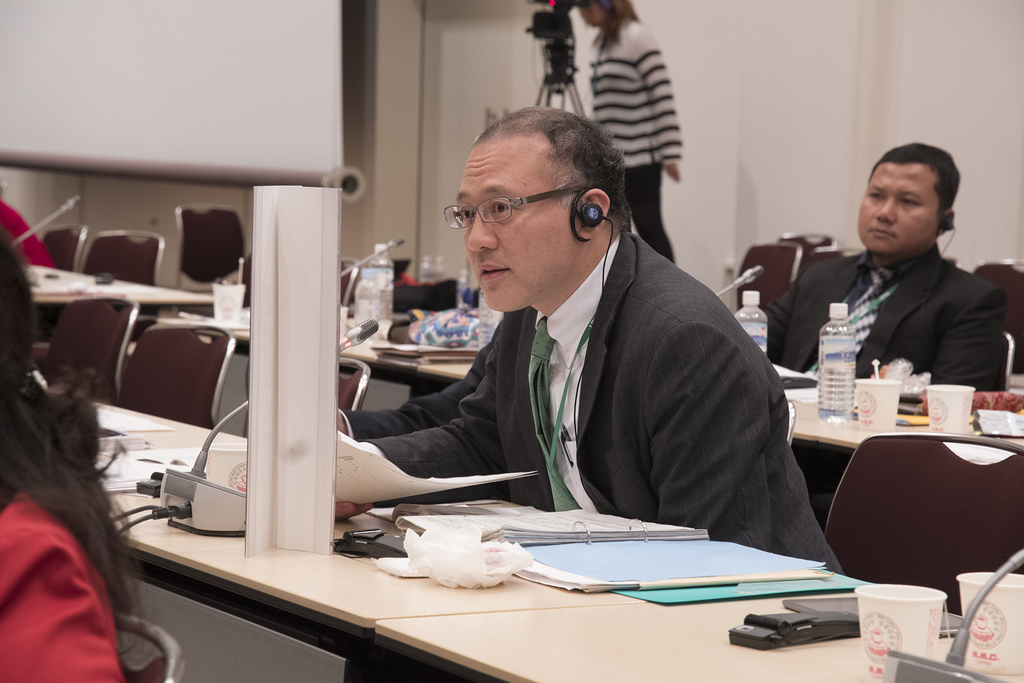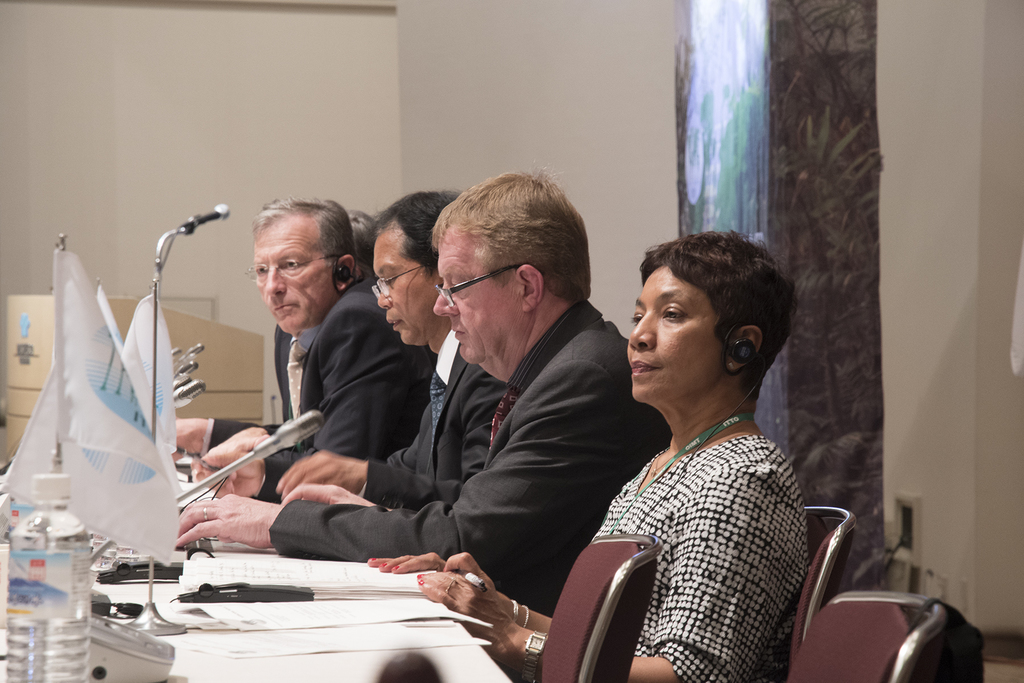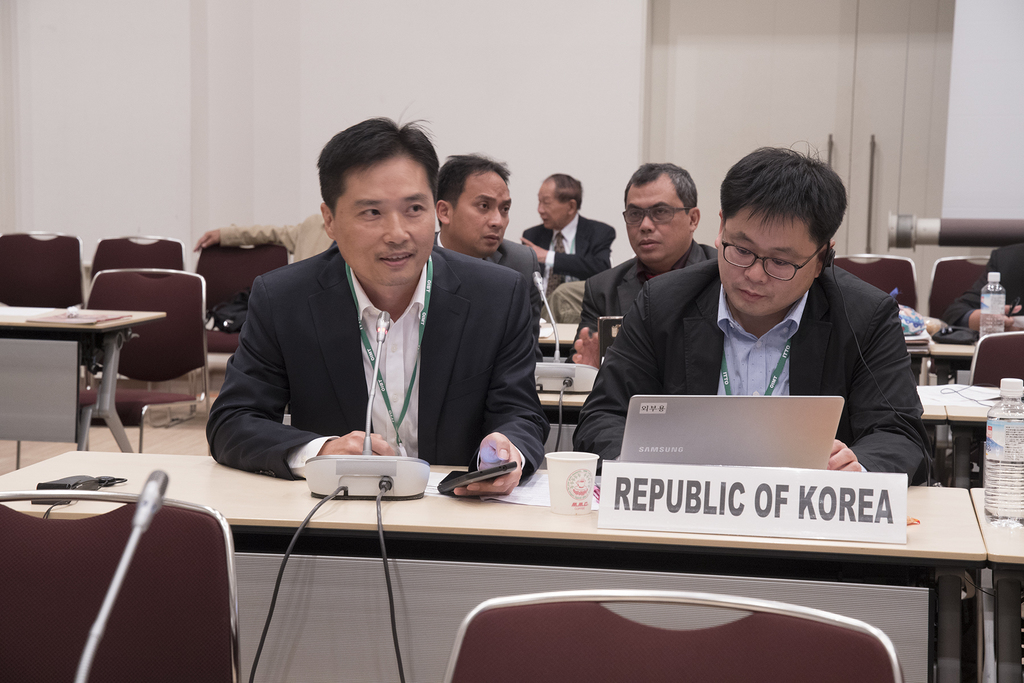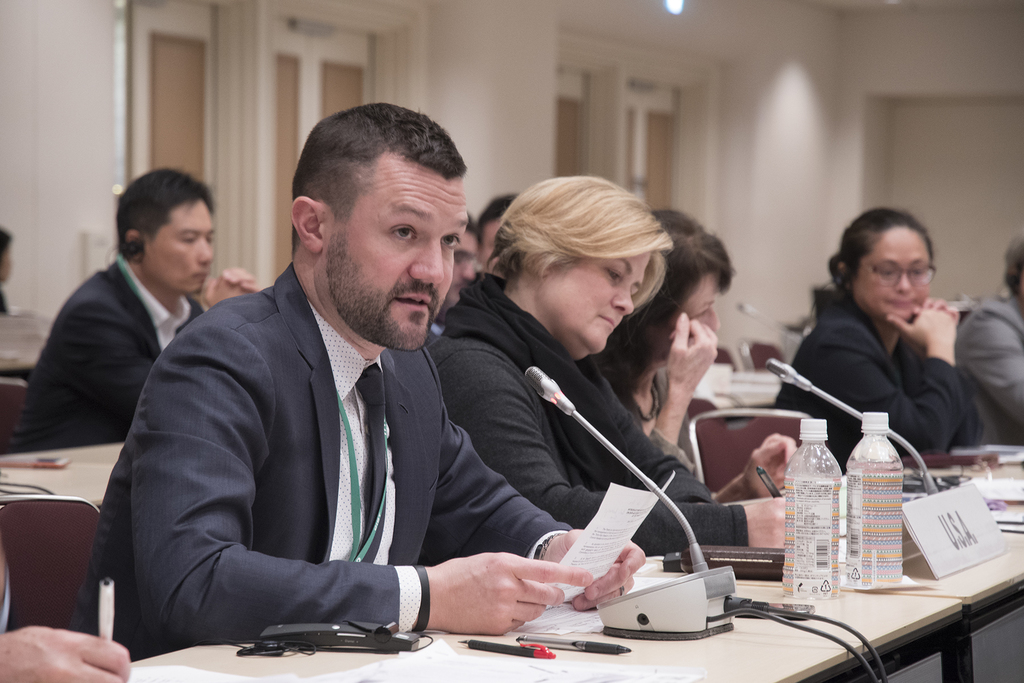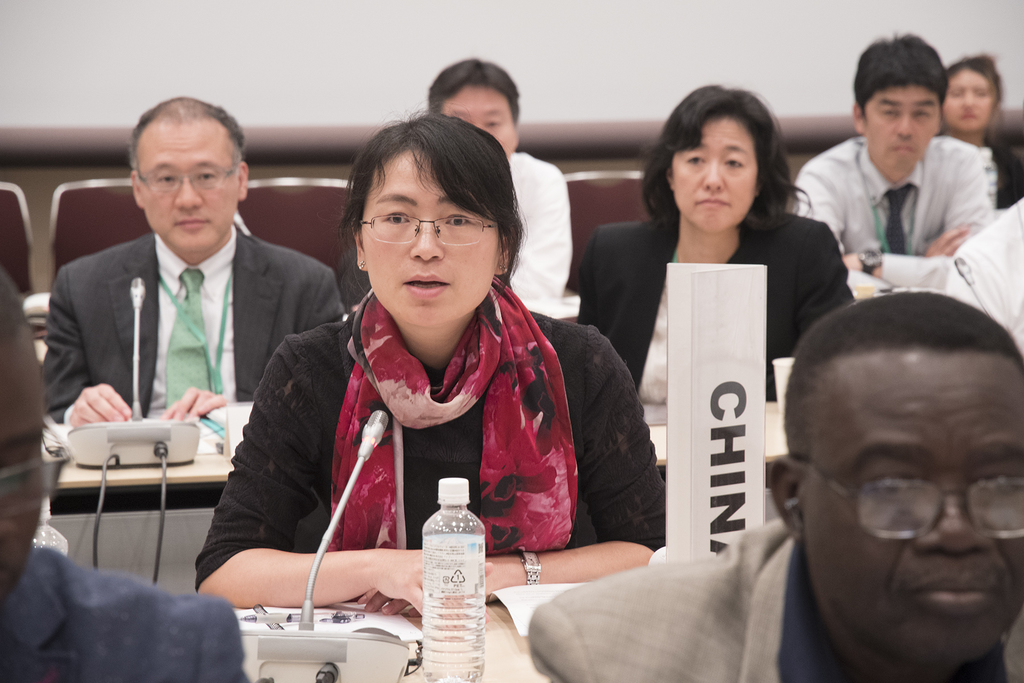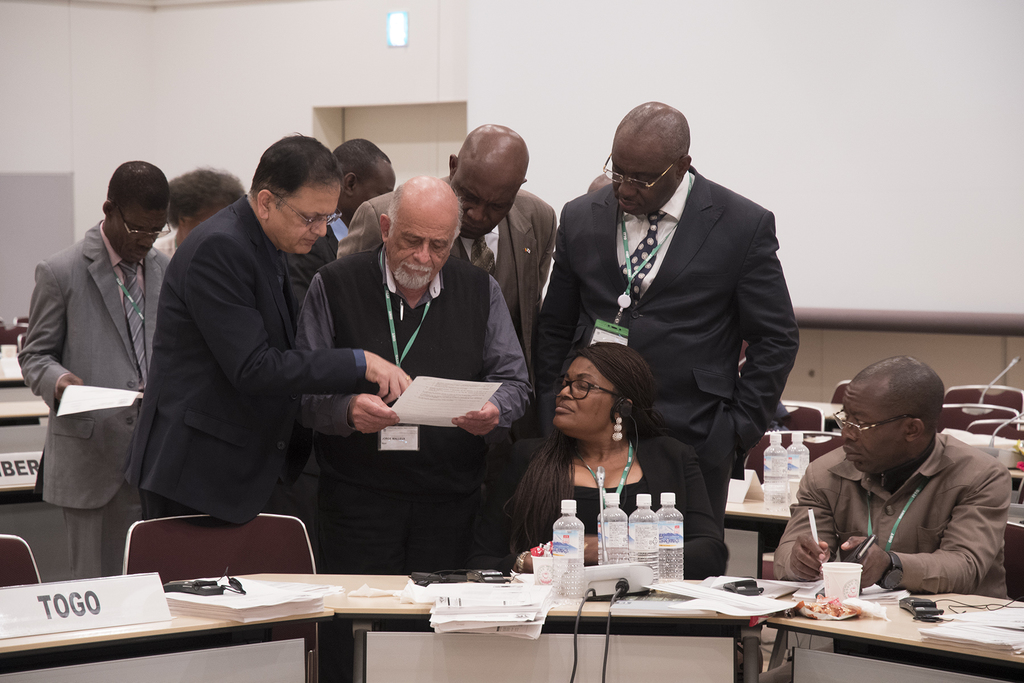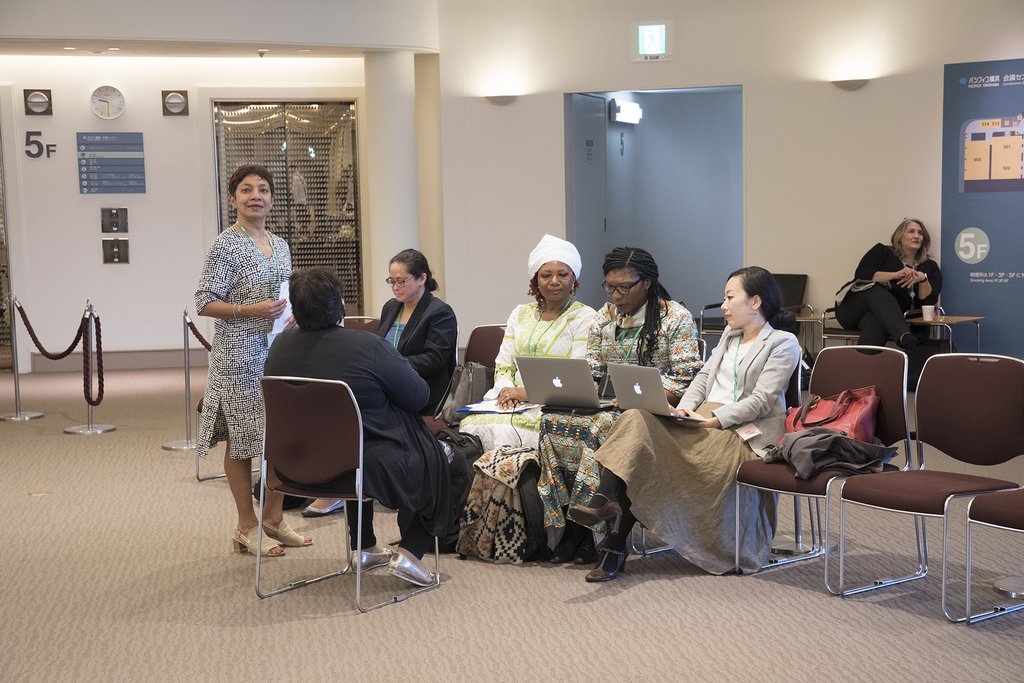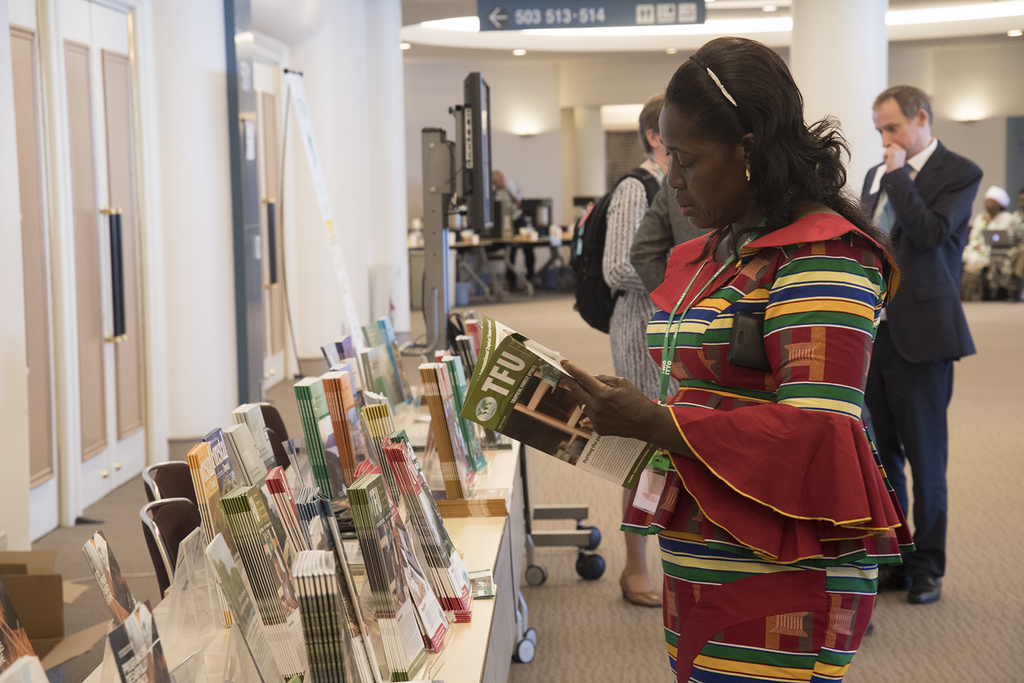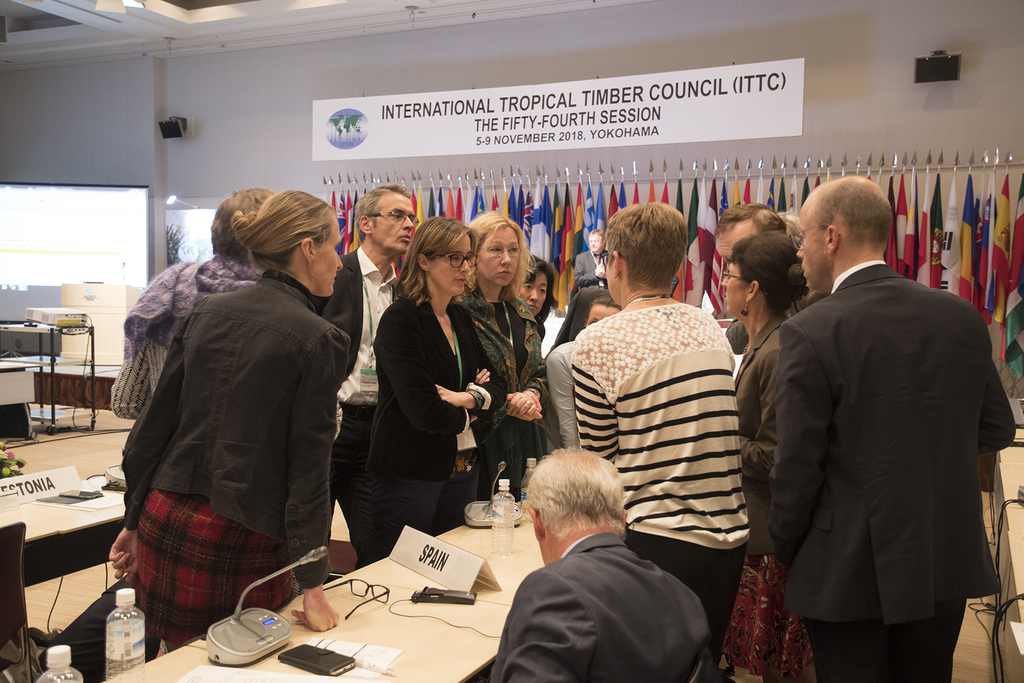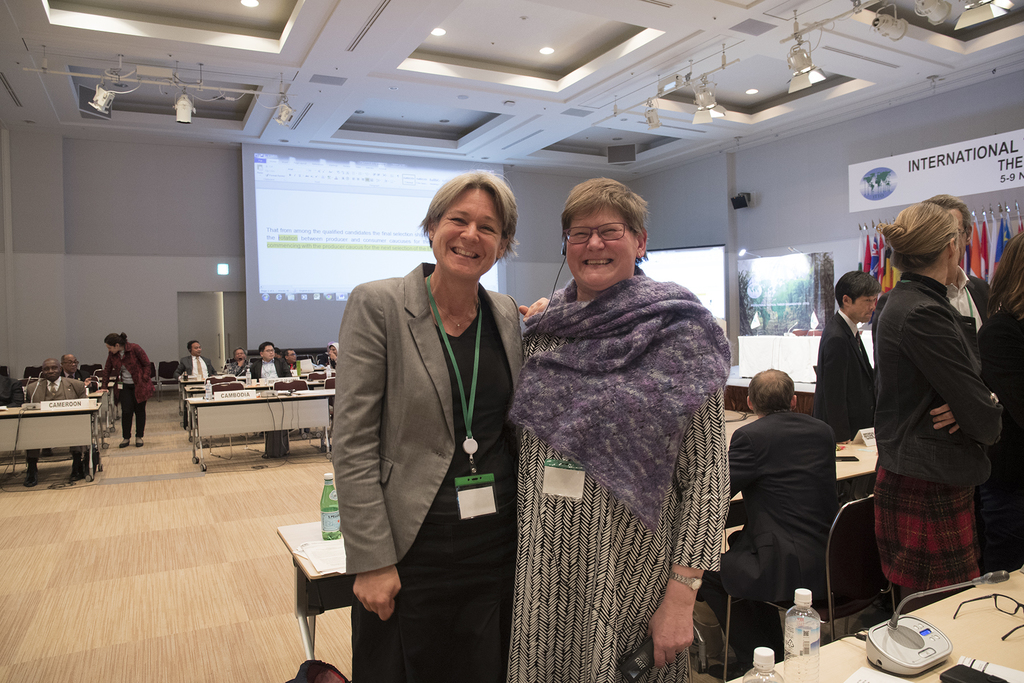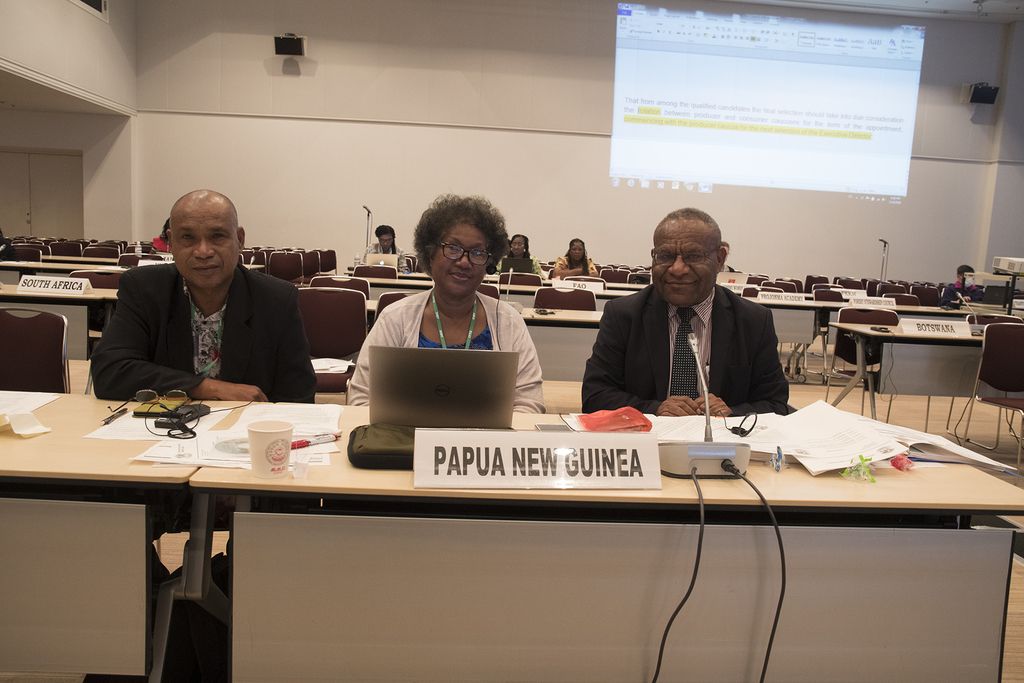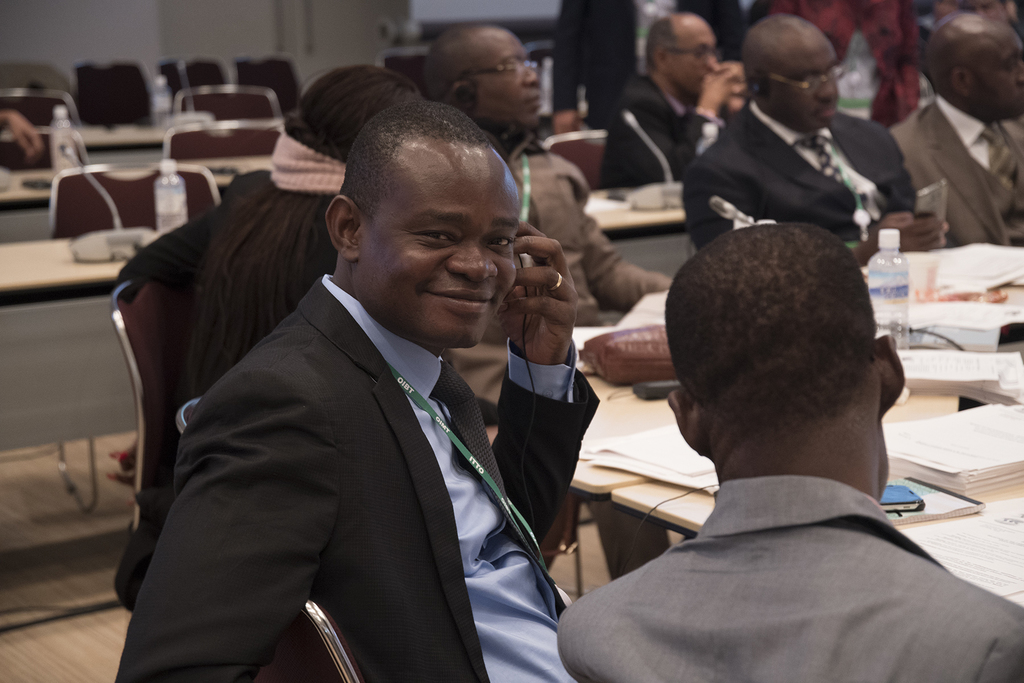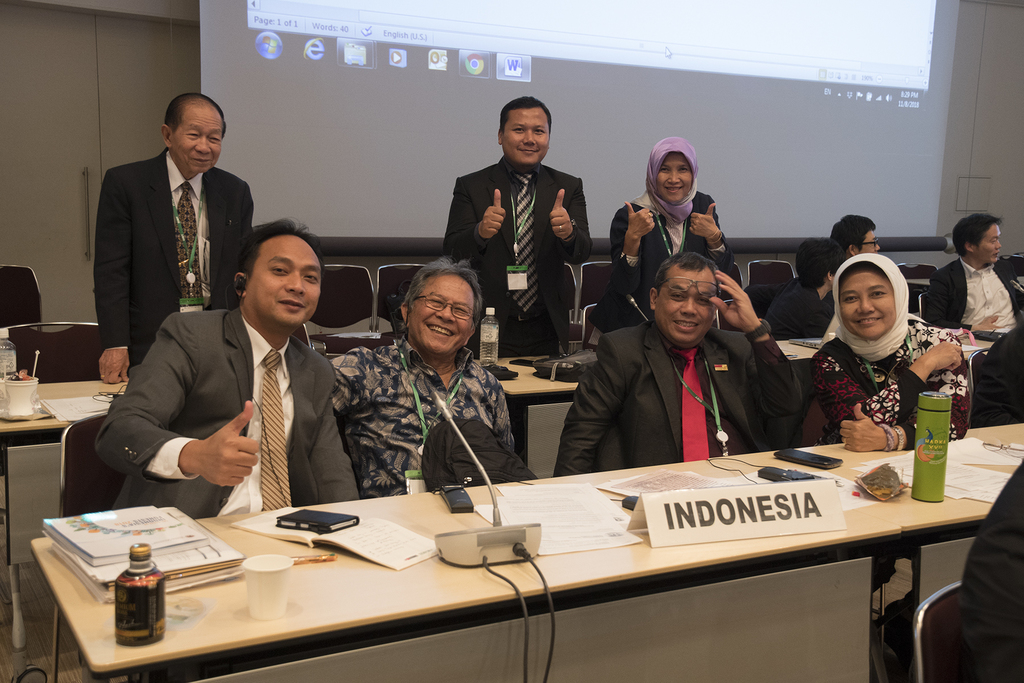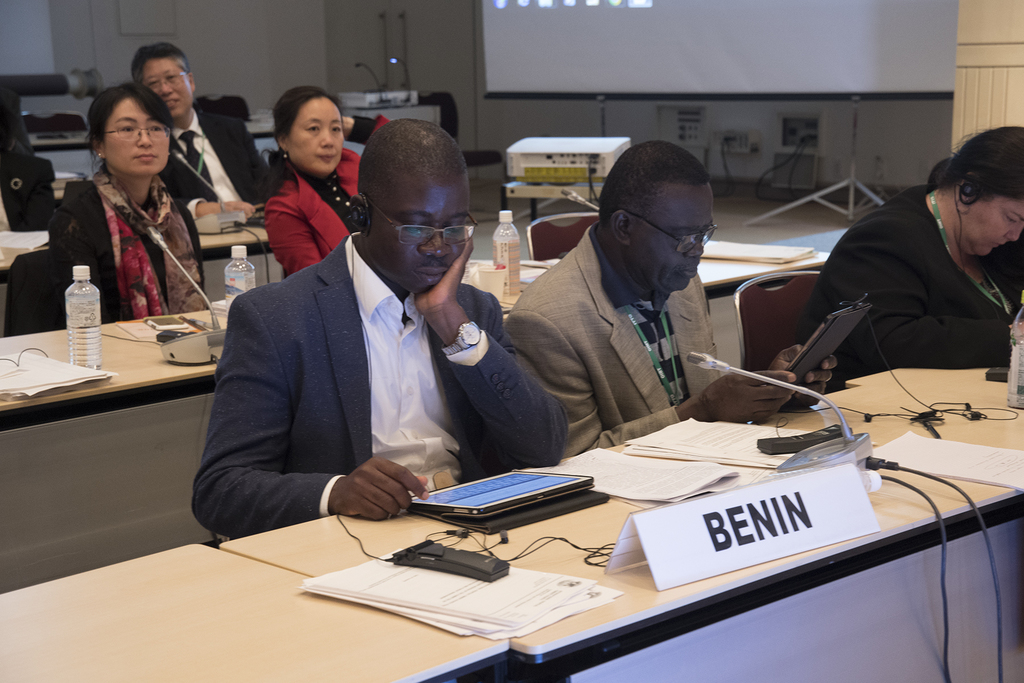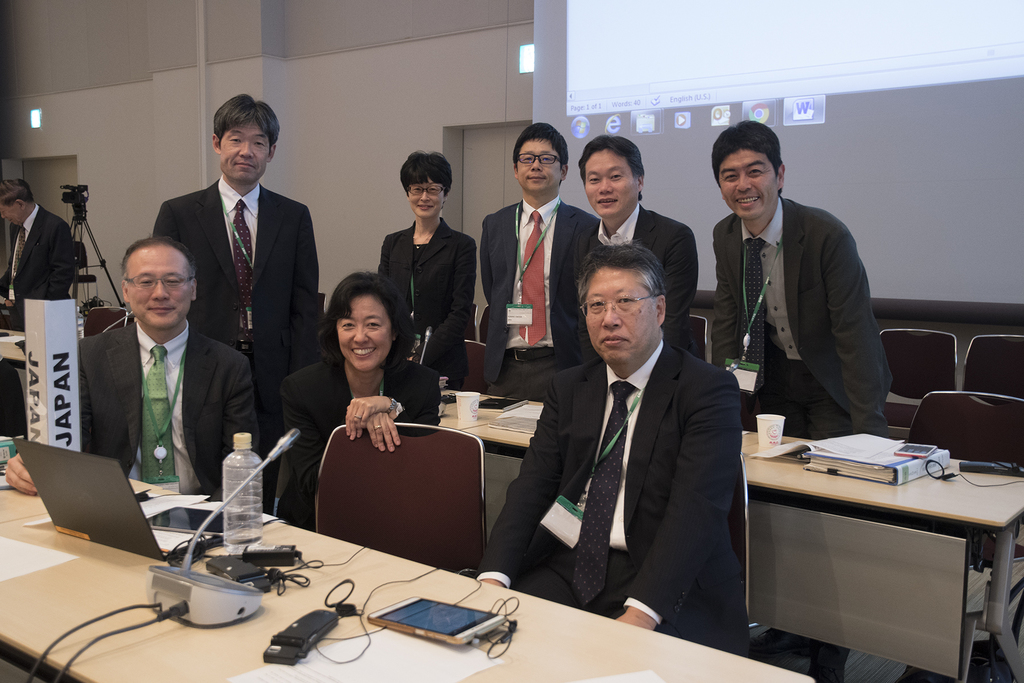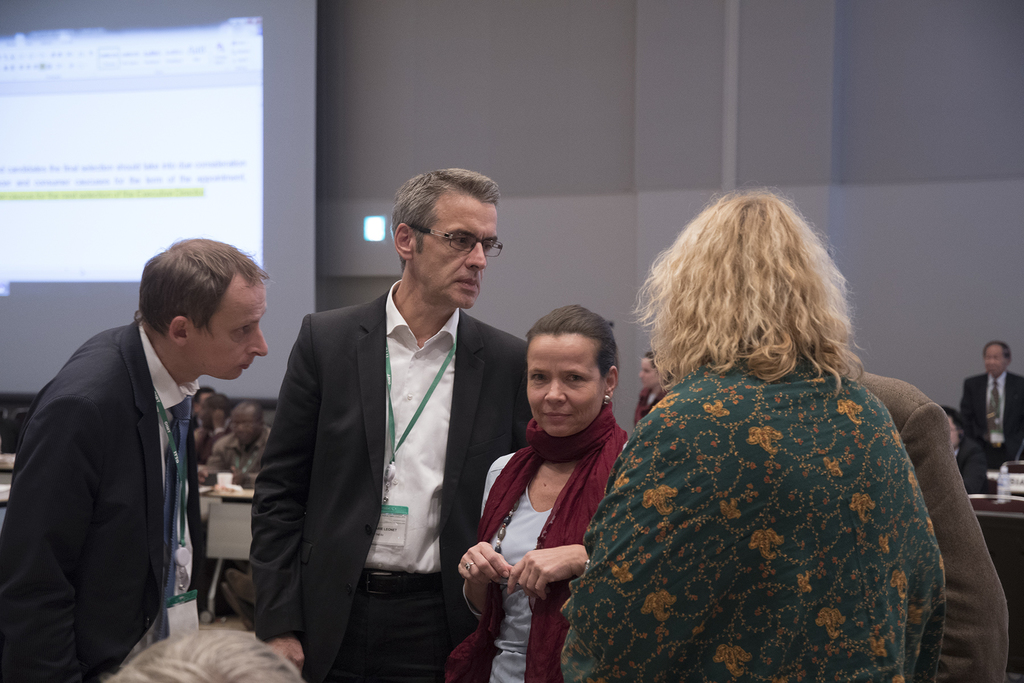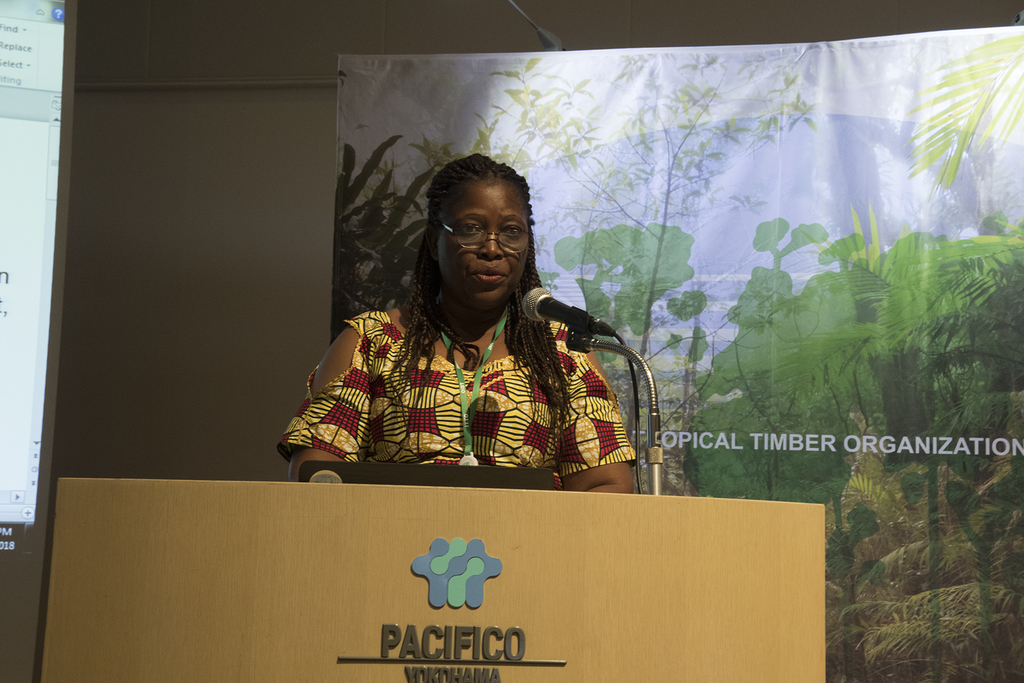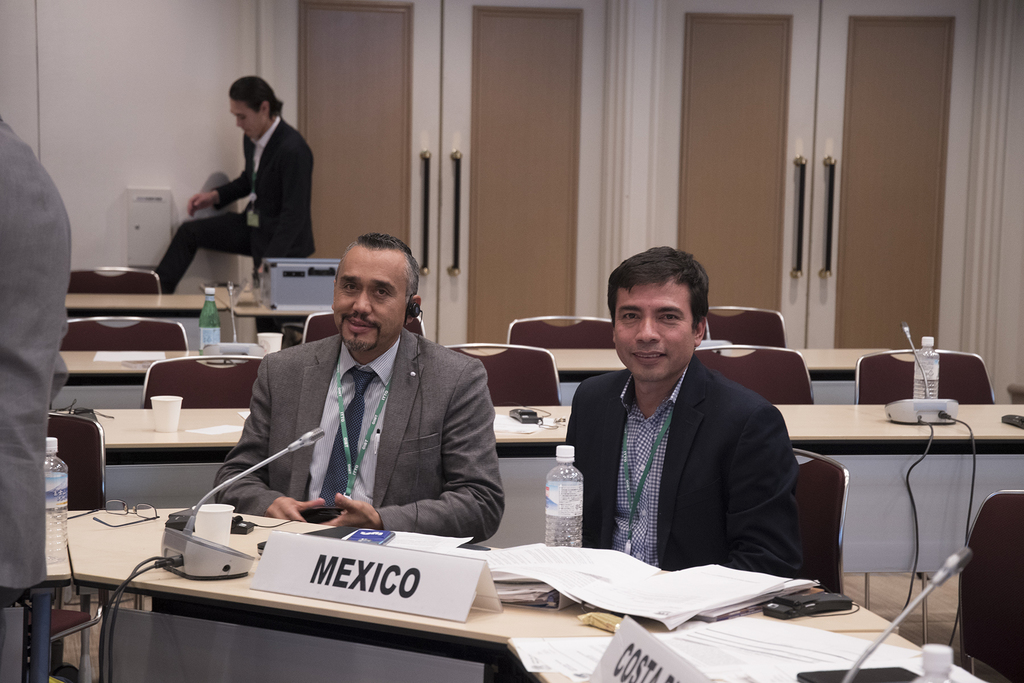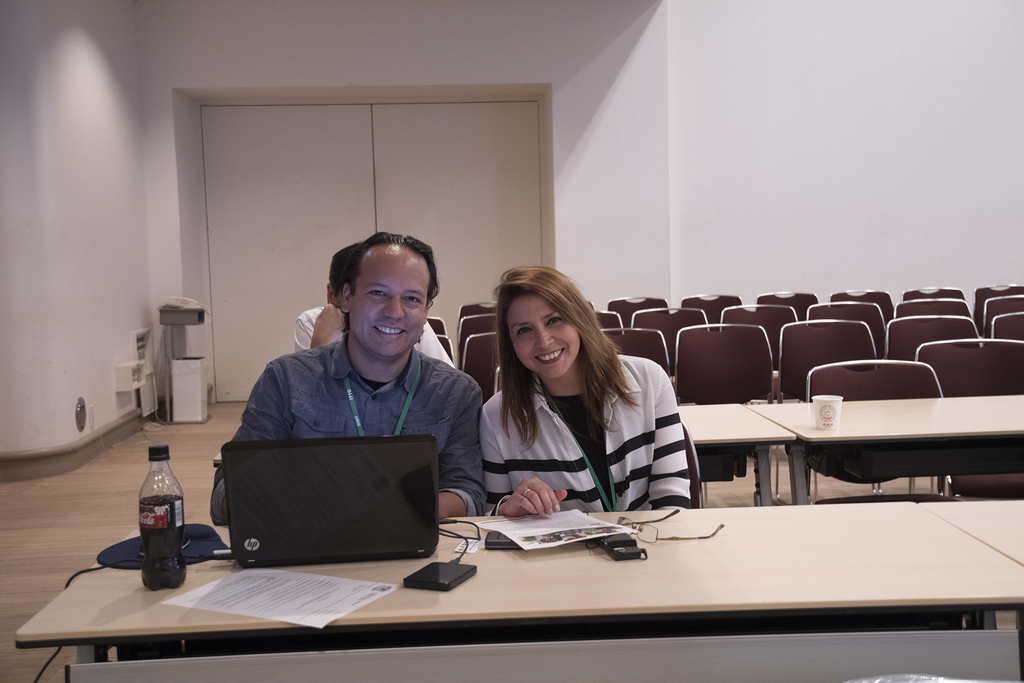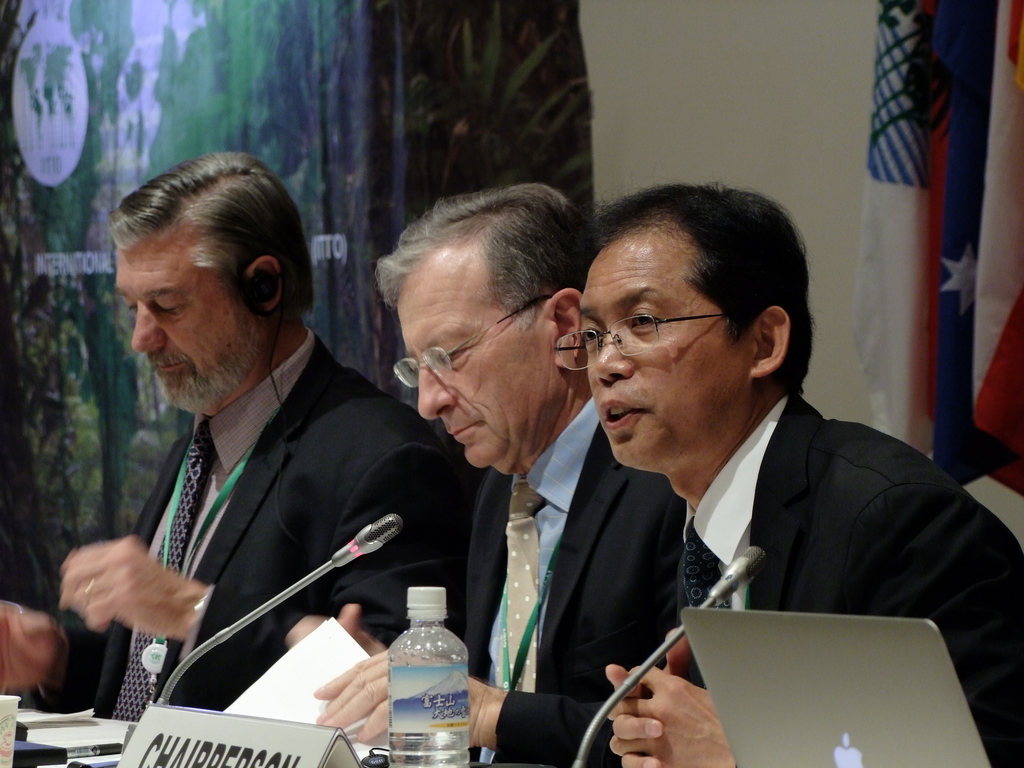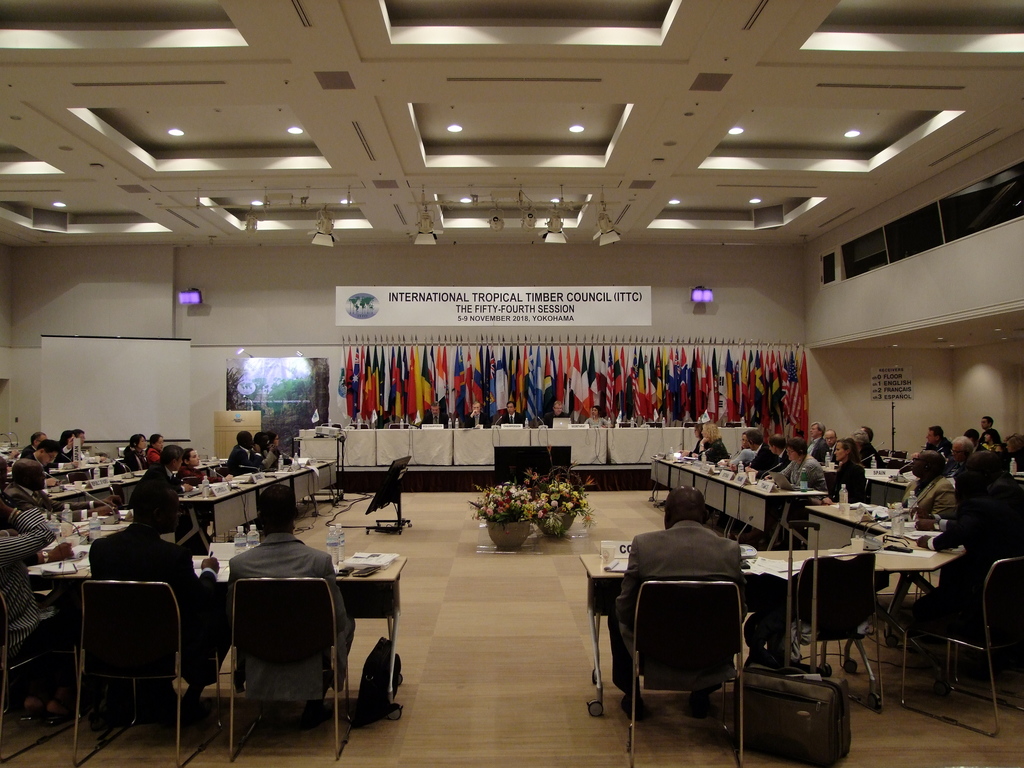Civil-society panel urges stronger role for women in forestry
Members, partners, table USD 3.8 million at Council session
Female panelists and staff gather on the podium at the conclusion of the discussion on the role of women in achieving ITTO's objectives. Photo: Y. Kamijo
Women’s role in the management of forests and other natural resources can no longer be forgotten or dismissed, said Rosalie Matondo, Minister of Forest Economy in the Republic of the Congo, in a video presented at a panel discussion on women, forestry and ITTO that took place today at the 54th session of International Tropical Timber Council.
“We must not forget that women represent more than half the population of our planet Earth,” said Mme Matondo. “Today, more than ever, we must opt for an inclusive management of natural resources, taking into account all actors, in community forests, around logging concessions or in biodiversity conservation concessions.”
“The principle of the development of these concessions and forest certification are guarantees for … the taking into account of the rural communities and the autochthonous populations in the sharing of the profits related to the exploitation of the forest resources and, at this moment, women can no longer be forgotten or dismissed,” she said.
Another member of the panel, Cécile Bibiane Njebet, President of the African Women’s Network for Community Management of Forests (REFACOF), said women are at the bottom of a hierarchical pyramid in forestry—they are overrepresented as small-scale forest management operators but hugely underrepresented as supervisors, coordinators and owners.
“Women have very limited access and control over forest resources, land, technology, financial resources, training, and information. They also lack awareness of their rights,” said Ms Njebet. “This needs to change.”
Among other things, Ms Njebet recommended that Council members encourage their government agencies to use ITTO’s recently adopted Policy Guidelines on Gender Equality and Empowering Women to link forestry and gender equality with Sustainable Development Goal 5 on gender equality and with other United Nations mechanisms on women’s empowerment.
Delphine Ahoussi, president of MALEBI, a women’s group in Côte d’Ivoire, described how an ITTO project in communities living near the Ahua gazetted forest had enabled women to restore degraded forest land through agroforestry, thereby increasing forest cover; improving food security; and reducing poverty among the local communities. Council members watched a recently produced video of the project.
Adi Estela Lazos Ruiz talked about a process in the Mexican municipality of Jamapa, Mexico, assisted by an ITTO project, to increase women’s participation in the formal forest sector.
“Knowing the importance of forest ecosystem services and of the active participation of the population to maintain them is essential, but it is not enough in the long run,” she said.
“Women and men need empowerment to propel themselves to action. Women are usually the heart of the families, keeping the family together and educating the children, so working with women is a way to community transformation.”
Francois van der Ven described her pathway into forestry, first in Belgium and then Africa.
“When you’re a woman in the timber trade, you have to know your business inside and out,” she said. She is now head of the Industrial Forestry Trade Union in Gabon.
Finally, Jennifer Conje from the US Forest Service said gender issues in forestry were not specific to tropical developing countries but existed in developed countries as well. She described the current US Forest Service initiative, “Stand Up For Each Other”, which is aimed at reminding everyone of their responsibility to protect one another from bullying, harassment and retaliation of any kind.
Ms Conje also shared personal experiences of the challenges and opportunities of being a female working in the forestry world.
The ITTO Secretariat’s Sheam Satkuru, who moderated the panel discussion, said the presentations showed what could be achieved when women were empowered in their communities and in the forest sector. There was a strong commitment in the Organization, she said, to fully implement its Policy Guidelines on Gender Equality and Empowering Women in all the Organization’s work, with the many benefits this will bring.
Statement by Civil Society Advisory Group
In a statement to Council members today, CSAG spokesperson Ms Jacqueline Gogwon-Gwet, from REFACOF in Cameroon, applauded the Council and the Secretariat for the opportunity to convene the CSAG panel on the role of women in achieving ITTO objectives. CSAG urged the Council to place CSAG plenary events in the regular Council agenda.
“We can work together on the topics of interest to both parties to provide relevant advice and inputs to Council’s deliberations,” said Ms Gogwon-Gwet. CSAG also urged ITTO members to increase stakeholder engagement in policy elaboration and implementation at the national level, she said.
The CSAG statement expressed disappointment that many ITTO member countries have not been paying their dues, and it addressed a range of other issues, including the need to disseminate and implement the Policy Guidelines on Gender Equality and Empowering Women.
Ms Gogwon-Gwet said CSAG “strongly encourages Council to ensure there are adequate resources available to ensure the ongoing participation of civil society and women in Council deliberations”.
CSAG was encouraged by strong support in the Council for developing a new fundraising strategy, said Ms Gogwon-Gwet, and would like to be among the partners involved in piloting any fundraising initiative.
Presentations from the panel are available here.
Members, partners, table USD 3.8 million
A total of USD 3.83 million of voluntary contributions was pledged or confirmed at the Council session today. This amount includes confirmation of a pledge of about USD 1.24 million made by the Government of Germany at the previous session in 2017. The funds will be used for a range of activities in the Organization’s Biennial Work Programme.
ITTO Fellowships were awarded to 22 applicants, including six women, from 12 producer member countries, at a total value of about USD 140 000.
Donors at the session included Germany, the United States of America and the Republic of Korea.
During the pledging session, the European Union indicated that the European Commission was considering contributing about EUR 300 000 for activities in the Biennial Work Programme and hoped to confirm this by the end of 2018.
Other matters
The Council made several decisions, mainly related to administrative measures and to fundraising designed to generate more resources for fulfilling ITTO’s mandate. The Council adopted the ITTO Anti-money Laundering and Counter Terrorism Financing Policy and reached a decision on the issue of rotation in the framework of the selection of the Executive Director.
A representative of the United Nations Forum on Forests Secretariat made a statement to the Council.
The delegate of Japan announced his country’s invitation to the Council to hold its 56th session in Yokohama, Japan, in 2019. The 55th session will be held in Lomé, Togo, on 2–7 December 2019.
All decisions made at the session, and other Council documents, including financial statements, will be available on the ITTO website in coming weeks.
The International Tropical Timber Council meets at least once a year to discuss a wide-ranging agenda aimed at promoting sustainable tropical forest management and the trade of sustainably produced tropical timber.
Coverage of the session by the Earth Negotiations Bulletin is available at http://enb.iisd.org/forestry/itto/ittc54
Women’s role in the management of forests and other natural resources can no longer be forgotten or dismissed, said Rosalie Matondo, Minister of Forest Economy in the Republic of the Congo, in a video presented at a panel discussion on women, forestry and ITTO that took place today at the 54th session of International Tropical Timber Council.
“We must not forget that women represent more than half the population of our planet Earth,” said Mme Matondo. “Today, more than ever, we must opt for an inclusive management of natural resources, taking into account all actors, in community forests, around logging concessions or in biodiversity conservation concessions.”
“The principle of the development of these concessions and forest certification are guarantees for … the taking into account of the rural communities and the autochthonous populations in the sharing of the profits related to the exploitation of the forest resources and, at this moment, women can no longer be forgotten or dismissed,” she said.
Another member of the panel, Cécile Bibiane Njebet, President of the African Women’s Network for Community Management of Forests (REFACOF), said women are at the bottom of a hierarchical pyramid in forestry—they are overrepresented as small-scale forest management operators but hugely underrepresented as supervisors, coordinators and owners.
“Women have very limited access and control over forest resources, land, technology, financial resources, training, and information. They also lack awareness of their rights,” said Ms Njebet. “This needs to change.”
Among other things, Ms Njebet recommended that Council members encourage their government agencies to use ITTO’s recently adopted Policy Guidelines on Gender Equality and Empowering Women to link forestry and gender equality with Sustainable Development Goal 5 on gender equality and with other United Nations mechanisms on women’s empowerment.
Delphine Ahoussi, president of MALEBI, a women’s group in Côte d’Ivoire, described how an ITTO project in communities living near the Ahua gazetted forest had enabled women to restore degraded forest land through agroforestry, thereby increasing forest cover; improving food security; and reducing poverty among the local communities. Council members watched a recently produced video of the project.
Adi Estela Lazos Ruiz talked about a process in the Mexican municipality of Jamapa, Mexico, assisted by an ITTO project, to increase women’s participation in the formal forest sector.
“Knowing the importance of forest ecosystem services and of the active participation of the population to maintain them is essential, but it is not enough in the long run,” she said.
“Women and men need empowerment to propel themselves to action. Women are usually the heart of the families, keeping the family together and educating the children, so working with women is a way to community transformation.”
Francois van der Ven described her pathway into forestry, first in Belgium and then Africa.
“When you’re a woman in the timber trade, you have to know your business inside and out,” she said. She is now head of the Industrial Forestry Trade Union in Gabon.
Finally, Jennifer Conje from the US Forest Service said gender issues in forestry were not specific to tropical developing countries but existed in developed countries as well. She described the current US Forest Service initiative, “Stand Up For Each Other”, which is aimed at reminding everyone of their responsibility to protect one another from bullying, harassment and retaliation of any kind.
Ms Conje also shared personal experiences of the challenges and opportunities of being a female working in the forestry world.
The ITTO Secretariat’s Sheam Satkuru, who moderated the panel discussion, said the presentations showed what could be achieved when women were empowered in their communities and in the forest sector. There was a strong commitment in the Organization, she said, to fully implement its Policy Guidelines on Gender Equality and Empowering Women in all the Organization’s work, with the many benefits this will bring.
Statement by Civil Society Advisory Group
In a statement to Council members today, CSAG spokesperson Ms Jacqueline Gogwon-Gwet, from REFACOF in Cameroon, applauded the Council and the Secretariat for the opportunity to convene the CSAG panel on the role of women in achieving ITTO objectives. CSAG urged the Council to place CSAG plenary events in the regular Council agenda.
“We can work together on the topics of interest to both parties to provide relevant advice and inputs to Council’s deliberations,” said Ms Gogwon-Gwet. CSAG also urged ITTO members to increase stakeholder engagement in policy elaboration and implementation at the national level, she said.
The CSAG statement expressed disappointment that many ITTO member countries have not been paying their dues, and it addressed a range of other issues, including the need to disseminate and implement the Policy Guidelines on Gender Equality and Empowering Women.
Ms Gogwon-Gwet said CSAG “strongly encourages Council to ensure there are adequate resources available to ensure the ongoing participation of civil society and women in Council deliberations”.
CSAG was encouraged by strong support in the Council for developing a new fundraising strategy, said Ms Gogwon-Gwet, and would like to be among the partners involved in piloting any fundraising initiative.
Presentations from the panel are available here.
Members, partners, table USD 3.8 million
A total of USD 3.83 million of voluntary contributions was pledged or confirmed at the Council session today. This amount includes confirmation of a pledge of about USD 1.24 million made by the Government of Germany at the previous session in 2017. The funds will be used for a range of activities in the Organization’s Biennial Work Programme.
ITTO Fellowships were awarded to 22 applicants, including six women, from 12 producer member countries, at a total value of about USD 140 000.
Donors at the session included Germany, the United States of America and the Republic of Korea.
During the pledging session, the European Union indicated that the European Commission was considering contributing about EUR 300 000 for activities in the Biennial Work Programme and hoped to confirm this by the end of 2018.
Other matters
The Council made several decisions, mainly related to administrative measures and to fundraising designed to generate more resources for fulfilling ITTO’s mandate. The Council adopted the ITTO Anti-money Laundering and Counter Terrorism Financing Policy and reached a decision on the issue of rotation in the framework of the selection of the Executive Director.
A representative of the United Nations Forum on Forests Secretariat made a statement to the Council.
The delegate of Japan announced his country’s invitation to the Council to hold its 56th session in Yokohama, Japan, in 2019. The 55th session will be held in Lomé, Togo, on 2–7 December 2019.
All decisions made at the session, and other Council documents, including financial statements, will be available on the ITTO website in coming weeks.
The International Tropical Timber Council meets at least once a year to discuss a wide-ranging agenda aimed at promoting sustainable tropical forest management and the trade of sustainably produced tropical timber.
Coverage of the session by the Earth Negotiations Bulletin is available at http://enb.iisd.org/forestry/itto/ittc54
The Chairperson of the International Tropical Timber Council, Mr Zhang Zhongtian, receives a framed gavel from incoming Chairperson, Mr John Leigh, at the close of the 54th session of the International Tropical Timber Council. Photo: K. Sato/ITTO
Around the venue of the 54th Session of the International Tropical Timber Council. Photo: K. Sato/ITTO
Members of the panel discussion on the role of women in achieving ITTO's objectives. Photo: K. Sato/ITTO
Gerhard Breulmann, ITTO Secretariat, presents the report on the ITTO Thematic Programmes. Photo: K. Sato/ITTO
Kumiko Tanaka, ITTO Secretariat, presents the report on the ITTO Fellowship Programme. Photo: K. Sato/ITTO
Adi Estela Lazos from Mexico spoke about the impact her ITTO Fellowship has had on her career. Photo: K. Sato/ITTO
Preparations outside the plenary hall before the panel on the role of women in achieving ITTO's objectives. Photo: K. Sato/ITTO
CSAG spokesperson Ms Jacqueline Gogwon-Gwet applauded the Council and the Secretariat for the opportunity to convene the CSAG panel on the role of women in achieving ITTO objectives. Photo: K. Sato/ITTO

